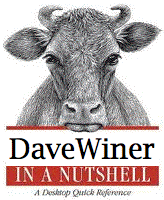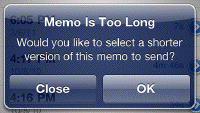
 What a mess
What a mess 
 Earlier I reported that Twitter was down just as I was publishing two big pieces. Then things got worse. The URL shortener we use that runs behind r2.ly went down too. So you were doubly-blocked by a creaky infrastructure that I was actually writing about in one of the pieces that didn't get through.
Earlier I reported that Twitter was down just as I was publishing two big pieces. Then things got worse. The URL shortener we use that runs behind r2.ly went down too. So you were doubly-blocked by a creaky infrastructure that I was actually writing about in one of the pieces that didn't get through.
It's poetry in motion. Actually non-motion.
People worry about SOPA, but you should also worry about the house-of-cards we've built around Twitter. We seriously need to simplify things. The people at Twitter need to hear this. A simple change in their software, that moves the link out of the 140 characters would completely obviate the need for shorteners, and allow us to remove a whole level of brittleness in the infrastructure.
It's always been this way, and the problem has persisted for years. They store a lot of metadata with each tweet, so there's clearly no reason their infrastructure would have any trouble at all supporting it.
Anyway, I temporarily switched to bit.ly, so the blork.ly address we use here is likely to work. As long as bit.ly is up.
Heh. What a mess.
 Blogger of the Year
Blogger of the Year 
Every year, when I have it together, I name someone blogger of the year.
It's always a person, never an organization -- because that's essential imho to being a blogger. To think of a tech pub like the NY Times or TechCrunch as a blogger is to miss the point. And anyone who is edited, in any way, is not a blogger. Because once you accept editing, you've allowed another mind into the writing. You're no longer finding out what someone thinks. It's not quite as clear.
Not to say one is better than the other. Just different.
Now, for past bloggers -- they continue to impress, in different ways of course because they're individuals. That's what made them such excellent bloggers in the first place! ![]()
They are: Joel Spolsky, Jay Rosen, NakedJen, Julian Assange.
This year's BOTY is...
In a minute. ![]()
First, let me say who I thought of, and why I think he may well be my choice for BOTY next year.
It came as a surprise to me that Stallman is a blogger. Somehow I tripped across his feed. Added it to my river, and since then have been very impressed. Stallman is, in every way, what I think of as a Natural Born Blogger. His impulse is to share. And he has an opinion. And he states it, concisely and with irony and humor. It's really good stuff.
And the thing I like about it most is that it is so concise.
Twitter has made this a value we appreciate, and that's something to thank Twitter for. With conciseness as an established practice, we're heading into a new kind of blogging. What I call a linkblog.
That's why I think Stallman might be a great choice next year, if things turn out as I think they will. I think enough of us will be linkblogging outside the silos to make it interesting. If this happens it will make new kinds of aggregators possible. New news flows. Because freedom has been bottled up in the silos for too long. Too much have we waited for them to innovate in ways that don't cause more money to flow to them. Over time the low-hanging fruit becomes riper and riper. Eventually a strong wind willl come and blow it all to the ground. That's what I look forward to. It didn't happen in 2011, so the linkblog isn't the trend, yet. Maybe it will happen in 2012.
But in 2011, the most value for me was with bloggers who continue to make a strong personal investment in the web outside the silos.
So I was looking for someone who had something to say, and who beat the drum regularly. Someone who said things in clear language that was accessible to large numbers of people. And who said things we really need to hear. Things to think about, to consider, to be reminded of.
Someone who leads and inspires.
I think you're going to be surprised at my choice.
His blogging meets all these criteria and more. I never know what's coming from his corner of the world, but I know when I read it I'm going to have something to think about. Whether I agree or not. All good bloggers do that, push you in a new direction. Change the world by changing minds.
Godin doesn't force his ideas on us. He presents them as part of a smorgasboard of thought that's available in any quantity you like. There's no programming involved. He draws you back to him by the quality of his provocation. He's really the best at what he does, and what he does is important.
So bravo Seth Godin!
Thank you for all the blogging, and please keep us well-supplied with lots of new ideas and ways of looking at things.
 Twitter is down
Twitter is down 
I published my end-of-year think piece, The Un-Internet, about an hour ago by posting it to my linkblog. Which, among other places, flows to Twitter. Which is down.
This has blunted the impact. No retweets, no kudos, no condemnation!
Proves the point of the piece so damned well.
We're way too dependent on the Un-Internet., which behaves somewhat like the Internet, but has chokepoints that can cut off the flow. The whole point of the Internet, from the point of view of the US Govt, was that it couldn't be cut off this way.
I like to say that RSS doesn't have a fail whale.
It's at times like this that it doesn't seem so cute.
 The Un-Internet
The Un-Internet 
The tech world is in an infinite loop.
I've written about it so many times, but that's how it goes with loops. You don't have to write original stuff more than once. Each time around the loop, at some point, everything comes back into style.
No need to list all the loops, other than to say Here We Go Again! ![]()
At issue is this: Control.
For whatever reason, the people who run the tech companies want it. But eventually the users take it.
I wrote in 1994, my first time as a chronicler of the loops: "The users outfoxed us again. It happens every fifteen years or so in this business, We lost our grounding, the users rebelled, and a new incarnation of the software business has been created."
In the same 1994 piece: "Once the users take control, they never give it back."
You can see it playing out in the Twitter community, and now the Tumblr community.
It isn't a reflection on the moral quality of the leaders of the companies, to want to control their users. But it's a short-term proposition at best. Either the companies learn how to take the lead from their users, or they will be sidelined. Unless the laws of technology are repealed, and I don't think laws like that can be repealed.
Lest you think I was smart enough to see this coming in my own early experience as a tech entrepreneur, I wasn't. We were scared of software piracy, didn't understand how we could continue to be in business with software that could be easily copied. So we established controls that made it difficult for non-technical users to copy the software. That created a market of other software that would copy our software. So it was reduced down to whether or not the users would knowingly do something we disapproved of. Many of our users were honorable, they did what I would have done in their place. They stopped using our products. I would regularly receive letters from customers, people who had paid over $200 for the disks our software came on, with the disks cut in half with a scissor. These letters made their point loud and clear. One day everyone took off their copy protection, and the users got what they wanted. I came to believe then that this is always so.
 This time around, Apple has been the leader in the push to control users. They say they're protecting users, and to some extent that is true. I can download software onto my iPad feeling fairly sure that it's not going to harm the computer. I wouldn't mind what Apple was doing if that's all they did, keep the nasty bits off my computer. But of course, that's not all they do. Nor could it be all they do. Once they took the power to decide what software could be distributed on their platform, it was inevitable that speech would be restricted too. I think of the iPad platform as Disneyfied. You wouldn't see anything there that you wouldn't see in a Disney theme park or in a Pixar movie.
This time around, Apple has been the leader in the push to control users. They say they're protecting users, and to some extent that is true. I can download software onto my iPad feeling fairly sure that it's not going to harm the computer. I wouldn't mind what Apple was doing if that's all they did, keep the nasty bits off my computer. But of course, that's not all they do. Nor could it be all they do. Once they took the power to decide what software could be distributed on their platform, it was inevitable that speech would be restricted too. I think of the iPad platform as Disneyfied. You wouldn't see anything there that you wouldn't see in a Disney theme park or in a Pixar movie.
The sad thing is that Apple is providing a bad example for younger, smaller companies like Twitter and Tumblr, who apparently want to control the "user experience" of their platforms in much the same way as Apple does. They feel they have a better sense of quality than the randomness of a free market. So they've installed similar controls. Your content cannot be displayed by Twitter unless you're one of their partners. How you get to be a partner is left to your imagination. We have no visibility into it.
Tumblr has decided that a browser add-on is unwelcome. Presumably it's only an issue because a fair number of their users want to use it. So they are taking issue not only with the developer, but with the users. They have admitted that the problem is that they must "educate" their users better. Oy! Does this sound familiar. In the end, it will be the other way around. It has to be. It's the lesson of the Internet.
My first experience with the Internet came as a grad student in the late 70s, but it wasn't called the Internet then. I loved it because of its simplicity and the lack of controls. There was no one to say you could or couldn't ship something. No gatekeeper. In the world it was growing up alongside, the mainframe world, the barriers were huge. An individual person couldn't own a computer. To get access you had to go to work for a corporation, or study at a university.
Every time around the loop, since then, the Internet has served as the antidote to the controls that the tech industry would place on users. Every time, the tech industry has a rationale, with some validity, that wide-open access would be a nightmare. But eventually we overcome their barriers, and another layer comes on. And the upstarts become the installed-base, and they make the same mistakes all over again.
It's the Internet vs the Un-Internet. And the Internet, it seems, always prevails.
 Moving a domain off wordpress.com
Moving a domain off wordpress.com 
I want to transfer frontiernews.org to hover.com.
Right now it's hosted on wordpress.com, using their domain management system.
I've done this before so I know there's a way to transfer a domain off wordpress.com.
I'm following the instructions on their howto page and not finding the links they describe.
I go to Store/Domains and don't see a link to Manage Your Domains.
The domain actually expired yesterday, but I went ahead and renewed it for another year.
However that did not get the links to show up. Still wondering how to move my domains off.
Update: Problem solved. I had already transferred the domain to hover.com. The error warnings I was getting from wordpress.com were ignore-able. However it can be hard to ignore messages that say you're about to lose a domain you care about.
 Morning Coffee Notes
Morning Coffee Notes 
Good morning!
The year is almost over, and finally we're getting some winter weather in NYC.
A few notes, along with coffee. A tradition here on Scripting News.
1. My visiting scholarship at NYU is over. It was a two-year thing, and with the fall semester complete, I am now once again a free agent. I'm going to go without a title for a while. I've changed my blogroll bio, accordingly. Thanks to the folks at Arthur Carter Institute for giving me the opportunity of associating myself with you all while I get my boots on the ground in NYC.
 2. When Diaspora came out, privately I said to people that I didn't give it much chance of success. I offered to help, since it came out of NYU. The kids were studying math and compsci just three blocks away from where the J-school is. They were being lauded by the press as the antidote to Facebook. I wanted to encourage them to try to lower expectations, both with the outside world and for themselves. It's true that they were no younger than Zuck was when he embarked on his adventure. But it's not wise to plan for such success. I'm sure Zuck himself didn't.
2. When Diaspora came out, privately I said to people that I didn't give it much chance of success. I offered to help, since it came out of NYU. The kids were studying math and compsci just three blocks away from where the J-school is. They were being lauded by the press as the antidote to Facebook. I wanted to encourage them to try to lower expectations, both with the outside world and for themselves. It's true that they were no younger than Zuck was when he embarked on his adventure. But it's not wise to plan for such success. I'm sure Zuck himself didn't.
And Diaspora would have one problem that Facebook didn't -- they would have to contend with an installed-base leader with hundreds of millions of users. Much better to aim for a small piece of the problem, do it well, and move on from there.
3. If I hadn't been at NYU at the time, I probably would have said something publicly. But I had a responsibility to them more than I had a responsibility to relate my theory publicly.
4. Now there are news reports that some people associated with Occupy are taking aim at Facebook. They want to make the Facebook for the 99 percent. Oy. Here we go again. There is no market for that. Facebook is the Facebook for the 99 percent. The goal should be to make something open and non-monolithic that provides many of the most valuable services of Facebook without the silo walls. It should not be something that an individual does, or a small group laboring heroically, rather it should be something that the Internet does.
5. The reporters thirst for a David vs Goliath story. They live for it. When they spot one they seize the moment. And then they copy each other, and the people become famous, but the product never materializes. Because the people promising to displace Facebook don't understand Facebook. The whole point is that everyone uses it. Not that it's good, or what people need or want. It's the universality that keeps them occupied. Merely cloning Facebook will likely not get a significant number of people to switch. Something new and fun that captures imaginations in ways that Facebook doesn't -- that's the goal.
6. That it emerges from the Occupy movement is a good thing of course. I've gotten to know some of the technical people there, and I don't think they have the idea, any more than I thought the Diaspora guys did.
7. I'm going to stick with building writing, reading and presentation tools around open formats, each component replaceable. I'm fairly sure that's what the open system of sharing ideas and media will look like. From there, let's try out lots of ideas. I should have been able to hook my tools into Diaspora. That I couldn't says that Diaspora has zero chance against a juggernaut like Facebook. Same with the new Occupy devteam. They aren't trying to make their stuff work with existing open tools. No way does that have a chance against monsters like Apple, Google, Facebook and Twitter.
8. Is the "golden age" of tech blogging over? Jeremiah Owyang says it is. I guess it's all about point of view. If you think tech blogging was Mike Arrington and TechCrunch, then yes indeed, it's over.
Not much more to say, except that TechCrunch was a blog when it started, but fairly quickly it became a tech pub pretty much like CNET or ZDNet. That one of them goes away doesn't add or subtract anything from the universe. The writers they employed will find other jobs. They will likely write the same stories they would have otherwise.
In the end they had the same point of view as CNET. A fundamental belief that money makes ideas worthwhile. It's understandable because they earn their salaries based on how much they please advertisers. It's like the hamster-farms they write about -- the readers are the product, and the customers are the advertisers. Bloggers, as I use the term, are the product without bothering with the advertisers. It's people and their ideas, for better or worse, and nothing more than that.
If that's what you mean by blogging, what they were doing at TechCrunch was not very relevant. They only wrote about bloggers in the aggregate, as if we were undifferentiated frankfurter meat to be counted and appraised, and then paid for. It's so much like the bundling that was being done in the real estate bubble. Eventually, I hope, the hamsters will buy their own cages, and make pubs like TechCrunch completely irrelevant.
My main concern with TechCrunch is that when they went to war with RSS there was a chance some Dilberts who read it would make bad decisions and decide to remove their feeds. Smart people would see it as hypocrisy, because if RSS is dead, why did TechCrunch bother to maintain an RSS feed? But there are managers at companies who don't think things through.
But RSS has no advertisers, so it's a safe thing for TechCrunch to criticize. Not many things left that they can be negative about.
 Linkblog pointers by domain, cont'd
Linkblog pointers by domain, cont'd 
On December 19, I posted the result of a little script I wrote that ranked the sites by the number of times I pointed to them in my linkblog.
Since the linkblog has been operating all of 2011, I thought it would be a good idea to tally the links for the year, and then roll it over at the beginning of the year and start tallying them for 2012.
So if you click on the little plus next to this headline in the blog post (for people who are reading this in an aggregator) you'll see the table. It's updated once every hour.
 What time is it?
What time is it? 
A few years ago, people said only old-fashioned folk wear watches. But I thought I would always wear a watch. Today I don't wear a watch. How do I find the time? Either I do without or I keep my eyes fixed on a screen that has the time in the upper-right corner. It's gotten so that I resent the fact that reality doesn't have the time in the upper-right corner.
 Dropbox is the computer
Dropbox is the computer 
A housekeeping/philosophical mini-post.
The housekeeping part -- I am using Dropbox again. I've narrowed my use to keep personal stuff out of there.
The philosophical part -- We used to say the network is the computer, but I'm seeing more and more that Dropbox is the computer. Once some data is availble in my dropbox, the question of which computer does what is entirely fungible.
Just shows there's more to the story. It wasn't all set when email was invented. ![]()
 The year is twenty-twelve
The year is twenty-twelve 
In the late 90s we wondered what the next decade would be called.
Here it is, the decade in question is now over, and we never answered the question.
Isn't that funny! Maybe that's why it feels like a lost decade. Never got a name.
Now I'm hearing people call the next year "twenty-twelve" even though this year was, as far as I'm concerned, "two thousand eleven."
Doc Searls asks if this is a trend, and I think it is. I think we'll look back and think "two thousand twelve" sounds funny.
Here's why.
We just came out of a decade that forced us, for the sake of clarity, to name the years as follows:
Two thousand one.
Two thousand two.
Etc.
Why? Because the following would have been ambiguous:
Twenty one.
Twenty two.
Etc.
But starting in 2010, there was no more ambiguity. Why did it take people this long to adjust?
I have no theory about that!
A little diversion on our way into the next year, whatever it may be called. ![]()
 While we have GoDaddy's attention
While we have GoDaddy's attention 
 I've transferred 35 domains out of GoDaddy in the last few weeks. I started the process long before the SOPA thing blew up. What finally got me to move was a $4.99 charge for a service I never wanted. I must have ordered it accidentally when reserving a domain. Something GoDaddy goes out of its way to make difficult and error-prone. We all know this. It could be a lot simpler. We all know that, I'm sure they do too.
I've transferred 35 domains out of GoDaddy in the last few weeks. I started the process long before the SOPA thing blew up. What finally got me to move was a $4.99 charge for a service I never wanted. I must have ordered it accidentally when reserving a domain. Something GoDaddy goes out of its way to make difficult and error-prone. We all know this. It could be a lot simpler. We all know that, I'm sure they do too.
It wasn't so much that I had the charge, but that it was almost impossible to get them to remove it. I got in contact with their support people and they said I had to do it myself, they couldn't do it "for" me. On what planet is a customer, expressing a very clear wish, asking you to do something for them. That's what you get paid for. To do things on my behalf. Hopefully you make enough money. If not, you should just charge more, not do these horrible ripoffs.
Even worse, the page they told me to go to, to get rid of the feature, didn't have the command they told me to look for. I used the search command in Firefox. The text wasn't there. I tried looking for text like it on the page. Nope. I tried viewing the source code of the page. Nope. I think they were actually lying about this. Unbelievable. All for $4.99.
Finally, I said I was going to send them a certified letter asking for the service to be removed from my account. When that wasn't enough, I decided to let them have the money and I'd just move off their service. And of course write up the experience here as a warning to any would-be future customer.
Of course there are a huge number of blog posts like that. GoDaddy didn't care. Fresh hamsters keep rolling up to the front door, ready to go through the same process they put me through. And all their other dissatisfied customers.
They like to say they have great support, and in some ways they do. But there is no way to have a line within a company that a customer respects. On one side of the line are the "nice" people, and over there are the assholes. If you, as a structural part of your business, defraud customers (and I believe what they do is fraud) then you don't have a "nice" part of your business. The whole thing is scum and deserves to die.
So, GoDaddy is backing off support of SOPA. But if they want to recover from this the way Johnson & Johnson handled the Tylenol poisoning scare, a textbook example of how a company should deal with a crisis, they must do more than back off SOPA. They must reconstitute the way they do business. Clean that site up. Streamline the domain registration and renewal process so you don't get page after page of boxes you have to check the right way to avoid getting ripped off.
They must change their company so that their support of SOPA could not have happened. Any company that takes sides against their customer's interest is a dead company. Every decision the company makes must be judged on how it effects their relationship with customers. Supporting SOPA was a bone-headed move. But this is a company that fights with customers over $4.99 charges for services they clearly say they do not want and have never used.
I can make them this offer because I still have 45 domains there. I am, as of right now, still a customer. I'm not talking about "progress" -- I want them to redesign their customer interface from top to bottom, and get the bullshit out of there. And teach your people that without customers you have no business, so their needs come first.
PS: Maybe it's time for Consumer Reports to rate Registrars.
 Listening is hard, and important
Listening is hard, and important 
If you have five minutes, read this item at FastCompany.
FastCompany: Using Empathic Listening to Collaborate.
I've had the same experience, on both sides. I grew up in a family where everyone was struggling to be heard. So you held the floor for a moment, before someone used something you said to go right into what they wanted to be heard about. There was probably almost no actual listening going on. As a result we all had a very poor idea of who the other people were, what motivated them, what they were trying to be heard on.
There's so much to say about this -- but hearing other people is all part of hearing yourself. And healing yourself.
When I was in my forties I made a concerted effort, with help, to go through as much of this as I could. And I was lucky that my parents were still alive so I could make a point of listening to them, to really understand -- whatever it is they wanted me to understand.
 Real listening is a secret technique for being friends with children. No one listens to them, even though they are complete emotional people after age four or so, with aspirations, ideas, interests, and a thirst for knowledge and desire for understanding. Showing a child that you respect her or him is a way to help that new person feel respect for themselves. In a very important way you are making the world a better place. In a human-sized way.
Real listening is a secret technique for being friends with children. No one listens to them, even though they are complete emotional people after age four or so, with aspirations, ideas, interests, and a thirst for knowledge and desire for understanding. Showing a child that you respect her or him is a way to help that new person feel respect for themselves. In a very important way you are making the world a better place. In a human-sized way.
If you want, try an exercise. With a close friend or family member, or a complete stranger (probably the same thing), sit at a table, or on the floor, facing each other. In a quiet place. Then take turns talking, five minutes at a time. When the other person is talking, don't say anything. Don't nod your head. Don't smile or give them a hug. Look straight ahead. Don't look up or down, to the side, behind you. Don't cry, show sympathy or fear. You may have all these feelings, but you may not demonstrate them. You are here for one purpose only -- to listen to the other person.
You'll find it's very hard to do, on both sides. To really hold the floor talking about yourself for five minutes, knowing the other person is hearing every word you're saying, and really absorbing it. For some people just this experience can be transformative. Listen to the actual words the other person is saying, and struggle to take them at face value, to really understand what they're saying.
That's why when I say "Thanks for listening" I"m giving you my deepest form of gratitude. Because life, in a sense, is all about being heard. Once you've been heard, it's then time to find new meaning for your existence.
This week might be the best time of year to do it. It's dark, the weather is probably not that great, what else do you have to do. And we're spending time with people we're close to. All the buttons are being pressed. Try getting through it by doing a little listening.
 Why GoDaddy is the right target
Why GoDaddy is the right target 
There's a lot of poetic justice in GoDaddy putting the big target on its own back, and the users taking aim, and shooting well enough to make the point. SOPA is the result of the entertainment industry figuring out what DNS is and how it works. Learning if they snip a few wires here and there they can control everything. It was always this way, but they didn't know.
DNS is the front-line of SOPA, and GoDaddy is probably the largest commercial entity in the DNS world these days. And they were so stupid they screwed it up. Shows how bad bankers and lawyers are at managing technology. Just imagine if they had some respect for people who do the plumbing.
 The only problem is that by trying to hijack DNS in such a public way, with legislation, the entertainment lawyers and lobbyists educated the users of DNS. People who own domains with GoDaddy. And now they're figuring out how to move their assets. Overnight Namecheap has a name (and is just as fast ruining it). It would have been a lot smarter for the MPAA to buy their way in. Didn't Verisign just sell itself really cheap. But then ICANN probably isn't as easy to push over as the US Congress. Or is it? (Honestly don't know, but some of the people who read this blog are involved in the ICANN process.)
The only problem is that by trying to hijack DNS in such a public way, with legislation, the entertainment lawyers and lobbyists educated the users of DNS. People who own domains with GoDaddy. And now they're figuring out how to move their assets. Overnight Namecheap has a name (and is just as fast ruining it). It would have been a lot smarter for the MPAA to buy their way in. Didn't Verisign just sell itself really cheap. But then ICANN probably isn't as easy to push over as the US Congress. Or is it? (Honestly don't know, but some of the people who read this blog are involved in the ICANN process.)
I love this little demo because it proves the Internet hasn't all been sucked into Facebook, Google, Twitter and Apple. We're not 100 percent silofied. All those domains that are moving away from GoDaddy point to places outside the BigCo silos. How about that people who say the Internet is dead. You're seeing new life. And eventually this power will show up inside the silos too.
 Namecheap lookin cheap
Namecheap lookin cheap 
Transferred ten more domains from GoDaddy to Hover this evening, without a hitch.
 Namecheap has a post kicking GoDaddy pretty hard. Too hard, really. Please be more careful. It could be that their customers don't have a lot of experience tranferring domains. It is tricky. Or it could be a bug or a glitch. We all know servers screw up sometimes, esp under heavy load.
Namecheap has a post kicking GoDaddy pretty hard. Too hard, really. Please be more careful. It could be that their customers don't have a lot of experience tranferring domains. It is tricky. Or it could be a bug or a glitch. We all know servers screw up sometimes, esp under heavy load.
Further, Namecheap is reaping a windfall. All the extra business they're getting isn't because they're good, rather because a competitor is bad. It doesn't look good to be kicking GoDaddy when they're already losing. They wouldn't like it if the tables were turned. There's plenty of anger for GoDaddy. No need for Namecheap to remind us we don't like them.
And it's good to see a shitty company getting taken out. This should be a message for all other companies who don't treat their users with respect.
I think the Registrar business has a lot of growing up to do. Even Hover, which is doing an excellent job, seems a bit over-eager, and unaware that their customers are very busy, and when they need help from a registrar it's often because we're fighting some kind of outage, and don't have a lot of cycles to spare. That said, it's better to have a registrar who goes out of their way to make sure things are working. But it'll be nice when they smooth out some of the rough edges. ![]()
I plan to do a lot more work with DNS in the future, already have done a bunch. So it'll be good to see this industry shake out some of the weak players.
 An incredibly bad movie
An incredibly bad movie 
 We go to the movies knowing that it's not real. If you want proof, next time you're watching a movie, or a preview -- focus on how the actors move their mouths and eyes while they talk, and then try to imagine someone in real life talking that way. Real people don't talk like that. And that's cool. We go to the movies to escape our real lives, to see things from another person's point of view, or from a different context. We ask to be deceived that it's real. Or just for a rush.
We go to the movies knowing that it's not real. If you want proof, next time you're watching a movie, or a preview -- focus on how the actors move their mouths and eyes while they talk, and then try to imagine someone in real life talking that way. Real people don't talk like that. And that's cool. We go to the movies to escape our real lives, to see things from another person's point of view, or from a different context. We ask to be deceived that it's real. Or just for a rush.
But sometimes it goes too far and the illusion breaks. Like an airplane stalling in midflight. They're running along great, you're in the plot, and all of a sudden something happens that doesn't make sense in the context of the story, and the trance is gone. All of a sudden you find yourself in a movie theater wondering how you got there, when you were in the movie just a few instants before.
And some movies never get you into the zone at all. You never even get liftoff.
Badly Written and Extraordinarily Stupid (I refuse to learn the actual name of this movie) never gets started. You never feel anything for the characters, yet how hard would that be, given the circumstances. They jerk you around, with cheap pictures of airplanes that might be flying into buildings. Blown up photos that don't look like people who fell or jumped to their death from the WTC. A kid's scrapbook that looks like it was produced by an ad agency working for Coca Cola or Land's End. A kid who might be feeling real emotions, or might be suffering from a disease. They won't commit. They won't actually give you a story to hang the scenes on. No takeoff.
I get disturbed just thinking about the events of 9/11, yet this movie that had two-plus hours never got my emotional meter to budge. It's amazing that this picture made it out of the movie factory, much less debuted on Christmas Day.
 NJFF -- here's the plan
NJFF -- here's the plan 
Okay here's the schedule for this year's NJFF.
9:45AM -- Tinker, Tailor, Soldier Spy.
1:00PM -- Extremely Loud and Incredibly Close.
4:25PM -- Carnage.
6-8PM -- Dinner.
8:10PM -- Young Adult.
All movies are at the AMC Loews Lincoln Square 13 except for Carnage which is at Lincoln Plaza Cinemas.
 This is a Facebook-free Zone
This is a Facebook-free Zone 
Back in the day I could post a request for a badge, and automagically one would appear.
From a great designer of course. ![]()
Let's see if it still works!
I need a badge for my blog that says This is a Facebook-free Zone. There are no Like buttons. No Facebook comments. No bugs that report to anyone at Facebook that you are here and have read this page.
Berkeley has signs on streets when you come into town saying it's a nuclear-free zone. I want something similar for my blog, except for Facebook.
I could see the day that I will only use sites that have this symbol and abide by the promise.
 Naked Morning coffee notes
Naked Morning coffee notes 
Just a few random notes for my outliner in the morning.
1. We had the plenary for the NJFF last night, here in NY of course. NakedJen and I went to see Mission Impossible in the IMAX theater on Broadway and 68th St. It was a great way to kick it off. It was like a roller coaster ride. And intellectual palate cleanse. Very light fare. But the images were thrilling. I thought the scenes with Tom Cruise flying around on the tower in Dubai were going to be the climax, and horrifying -- and they were that, but the climax came later, with a missile headed for Seattle or was it San Francisco? The writing was pretty shitty, sometimes movies can be appreciated for their shittiness. This movie was a fine way to start the fest. (Which now is a three-day affair?)
1a. Tonight's movie might be Carnage, starring the wonderful Kate Winslet.
1b. Listings for theaters around Lincoln Center.
1c. The best part of the movie was the preview for some new Batman movie, in IMAX of course. Super-thrilling! Freaky.
 2. I was quoted in several places telling people to kill their GoDaddy accounts. That was incorrect. I think it's a pointless gesture. Dan Gillmor asked why. SOPA is not yet law, not even close. It seems likely it won't make it through all the hurdles. This time. But they'll keep coming back. And if they ever do get a law that tries to turn the Internet into a movie theater, that's the time to act. Occupy the movie theaters. Shame the actors whose lawyers are foreclosing on the Internet the way a banker forecloses on a bad mortgage. You can't be popular with the people, Mr and Ms Hollywood Star, and support killing free expression on the net. It's an either/or thing. It's like a Hollywood action film. There are good guys and bad guys. If you don't act out against what your industry is doing to our freedom, then you're the bad guy. We should all be looking for a lot more than outspoken-ness from our favorite movie and recording stars, esp the ones who use social media. Not just speeches or symbolic gestures, real action. That's why now is not the time, because there can only be symbolism now. Later, if it comes to that, there can be movement.
2. I was quoted in several places telling people to kill their GoDaddy accounts. That was incorrect. I think it's a pointless gesture. Dan Gillmor asked why. SOPA is not yet law, not even close. It seems likely it won't make it through all the hurdles. This time. But they'll keep coming back. And if they ever do get a law that tries to turn the Internet into a movie theater, that's the time to act. Occupy the movie theaters. Shame the actors whose lawyers are foreclosing on the Internet the way a banker forecloses on a bad mortgage. You can't be popular with the people, Mr and Ms Hollywood Star, and support killing free expression on the net. It's an either/or thing. It's like a Hollywood action film. There are good guys and bad guys. If you don't act out against what your industry is doing to our freedom, then you're the bad guy. We should all be looking for a lot more than outspoken-ness from our favorite movie and recording stars, esp the ones who use social media. Not just speeches or symbolic gestures, real action. That's why now is not the time, because there can only be symbolism now. Later, if it comes to that, there can be movement.
3. I'm doing more digging into JavaScript. It is indeed very close to UserTalk, the language I designed. So I understand how it works. I'm finding the curly braces and semi-colons to be a nuisance (I forget to put them in, our language doesn't require them). But I'm liking doing software that runs in the browser, with very limited communication with servers. Having worried about scaling for all these years, it's fun to be relieved of that concern.
4. The project I'm doing is integrating rivers with the Bootstrap Toolkit, in an entirely static way. My prototype for this work is my personal river. Note that the RT's work. All you have to do is set up a linkblog server that can "catch" the kind of message it throws. Do a view source to see how the scripts work. And you can see how I edit the template, in an outline of course, and I use Dropbox to connect the outliner with the web app. Works like a charm. (I mirror my dropbox public folder in my own S3 space, that's what dropbox.scripting.com is.)
5. With cookies and JavaScript you can almost do a real application.
6. I need a good reference book for JavaScript. Real quick, show me how all the syntax works, and give me a list of all the built-in verbs.
Morning coffee notes 
Just a few random notes for my outliner in the morning.
1. We had the plenary for the NJFF last night, here in NY of course. We went to see Mission Impossible in the IMAX theater on Broadway and 68th St. It was a great way to kick it off. It was like a roller coaster right. Very light fare from a writing standpoint. But the images were so thrilling. I thought the scenes with Tom Cruise flying around on the tower in Dubai were going to be the climax, and horrifying -- and they were that, but the climax came later, with a missile headed for Seattle or was it San Francisco? Like I said, the writing was pretty shitty, but the movie was a fine way to start the fest.
2. On Twitter yesterday I felt it was necessary to clear up that I was not recommending people boycott anyone at this time over SOPA. It's not law, not even close, and I have a feeling it's not going to make it through all the hurdles. This time. But they'll keep coming back. And if they ever do get a law that tries to turn the Internet into a movie theater, we'll just occupy the movie theaters. And we'll shame the actors whose lawyers it is that are trying to foreclose on the Internet the way a banker forecloses on a bad mortgage. You can't be popular with the people, Mr and Ms Hollywood Star, and support killing free expression on the net. It's an either/or thing. And we should all be looking for a little more outspoken-ness from our movie and recording stars, esp the ones who use social media.
 GoDaddy says SOPA okay
GoDaddy says SOPA okay 
 GoDaddy likes SOPA. They said so on their website.
GoDaddy likes SOPA. They said so on their website.
GoDaddy was bought by an investment banking firm. So they're probably not coming at SOPA as a technology thing. I'm sure they see it as corporate lawyers would. And lawyers don't see what the fuss is about. They were never that into freedom anyway.
Step by step, the United States is becoming China. Not surprising since we're financially very closely tied. And the financiers want the Internet to keep us docile and quiet, and they don't want any of the crazy Arab Spring type stuff, not in the Arab world, not in China, and definitely not in the west.
It's all the same as Matt Taibbi points out today in a Rolling Stone piece about the rich and their awful PR. But why should they care. It's not as if anyone can do anything about it. We really can't. So they can boast about their money, trophy wives, jet-set lifestyle. They didn't bother to hire a PR person to make it sound pretty. There was no need. ![]()
Anyway, the GoDaddy thing has an easy resolution. One or more of their competitors can issue statements that are the mirror-image of GD's. Then the users who want to move can have a place to move to. It'll be basically symbolic, because if the US has a political firewall, whether your registrar is inside or outside the US won't matter. And it won't matter whether they do or don't like SOPA.
I already decided to start moving off GoDaddy a couple of months ago. I'm using a Canadian registrar, Hover, which is part of Tucows. I've known the guys there for a long time, and they have a great reputation. And they're Canadian. Not sure how much independence that actually gets you these days. But it's better than using GD.
The only good thing about SOPA is that it will get people into the streets. All kinds of civil disobedience will be possible once we no longer have the Internet as a distraction, or soporific.
 Update on NJFF
Update on NJFF 
See the previous post about the NakedJen Film Festival.
Now for the updates.
First, NakedJen has arrived in NYC. As usual her presence has turned NYC into a festival.
Second, it's now less than three days to the beginning of the festival, and that means we have the movie listings. Pretty sure we're going to be able to see everything we want to see within walking distance of Lincoln Center. So here's the appropriate Google Movies listing page.
Jen has offered this possible lineup: "Young Adult, Mission Impossible, Extremely Loud, Tin Tin, Tinker Tailor Soldier Spy or even Carnage."
Obviously we couldn't see all these movies in one day. Or could we! ![]()
 Facebook drones in the sky?
Facebook drones in the sky? 
 Drones in the news. Lots of stories out there about the coming legal drones in America's skies. The police and Customs are already using drones to spy on drug dealers. But drones are cheap enough that regular people will afford them. Instead of putting traffic helicopters in the air, use a drone. Cheaper, lighter, quieter. Safer? I guess you can afford to lose a drone. But if one lands on your head? House?
Drones in the news. Lots of stories out there about the coming legal drones in America's skies. The police and Customs are already using drones to spy on drug dealers. But drones are cheap enough that regular people will afford them. Instead of putting traffic helicopters in the air, use a drone. Cheaper, lighter, quieter. Safer? I guess you can afford to lose a drone. But if one lands on your head? House?
What about the day when Google decides to upgrade their maps app to provide real-time views? That's scary because they have the money to put up a lot of drones. And we know they're interested in airplanes. They want the old blimp hangar at Moffett Field. Maybe that's where they'll put their drone factory.
But the really scary idea is when Facebook, flush with cash from their IPO, deploys a fleet of drones to all our houses!
Talk about Frictionless Sharing.
I don't know if it's happening in 2012, but the day will come when Larry/Sergey and Zuck are having Drone Wars over the skies of America. You think papparazi are bad? Just wait! ![]()
 I now see Stallman's logic
I now see Stallman's logic 
Last Wednesday I wrote a piece describing some features I wanted in Disqus, the commenting system I use here on Scripting News.
I sent a pointer to Daniel Ha at Disqus, but not much of a discussion followed (heh) -- which isn't surprising. Daniel is a busy guy, and I'm just a user. It's easy to say no to users.
However...
I still want the feature.
It goes like this.
Twitter limits you to 140 characters. I think it's brutal, but it serves a purpose. It keeps people concise.
Commenting software serves another purpose. You can comment. Hence its name. ![]()
A comment is a short thing. Like "There's a broken URL in this post" or "I found the code you're looking for, here's a pointer."
But it should be possible to post something a bit longer to a comment, because sometimes we move a thread to a blog post because it can't be dealt with adequately in such a constrained space. You can breathe more easily in a comment thread. It's for problem solving. Twitter is good for announcing the problem, not solving it.
However sometimes people use commenting software to write blog posts. Why do they write blog posts in other people's comments sections? I don't know, but I wish they wouldn't do it in mine. No one reads them. I want my comment threads to serve a purpose. They're not a place for random people to vent or tell their life story. They're here to accumulate knowledge and interesting perspectives. Not your rants, missives, screeds, autobiographies. Those belong in your space.
I believe this very strongly. And I'm not a totally random person, please. So don't treat me like one.
 Anyway -- I've heard that WordPress has the feature I want. It can limit comments to a blogger-determined maximum. I'd start with 1024 characters and see what happens. The text area wouldn't accept more than 1024. There would be a little JavaScript counter that says how many are left. Just like Twitter, but with a more generous allocation. But one that would be determined by the sysop.
Anyway -- I've heard that WordPress has the feature I want. It can limit comments to a blogger-determined maximum. I'd start with 1024 characters and see what happens. The text area wouldn't accept more than 1024. There would be a little JavaScript counter that says how many are left. Just like Twitter, but with a more generous allocation. But one that would be determined by the sysop.
I could see playing some games with this. Like Casual Friday -- maybe one day a week we could up the minimum to 5000 characters.
Either enough people want this feature so Daniel & Co add it. Or I switch to some other software that has the feature (not desirable, but possible, I'd still use Disqus to host the old comments and use the new software for new posts). Or write my own software that does what I want (horrible, I already have way too much stuff on my plate to seriously consider adding something new to the mix, but if I have to I will do it. I have written commenting software that was used by a lot of people. However I don't relish dealing with spam. That looks like a massive undertaking.) Or do without.
Maybe finally I see the logic of Stallman's open source militancy. What a crock that I'm boxed into such a corner, for so long, because the developer of software I use, and promote, won't give me what amounts to a very small feature. I mean really, in the big perspective, isn't it ridiculous that a programmer would have to wait for such a long time (I asked for this the first time over a year ago) for something that could probably be added in an afternoon.
 A new header graphic
A new header graphic 
I was doing some work today on photo pages in the world outline browser, and came across this great picture of a San Francisco Bay sunset taken from Indian Rock in Berkeley, in May 2008. I thought it would make a great header graphic, and since I'm using those again, I wanted to see if I remembered how to do it. So here's the header.
 NakedJen Film Festival/NYC 2011
NakedJen Film Festival/NYC 2011 
Coming soon (Christmas Day) to theaters near me. ![]()
The concept of the NJFF, by NJ herself.
I wrote up the 2008 festival in Berkeley.
Candidate movies:
Extremely Loud & Incredibly Close. Starring Tom Hanks and Sandra Bullock.
A tweet from NJ. "We must see THE DARKEST HOUR. Also, EXTREMELY LOUD. Possibly, ADVENTURES OF TINTIN and YOUNG ADULT."
Friday's movies on Google Movies.
JY suggests seeing The Artist.
NYT reviews Adventures of TinTin.
Jen and Arikia agree we need to see We Need To Talk About Kevin.
 On the net, your feed is you
On the net, your feed is you 
I read a piece on NextWeb that talked about a service called pen.io, that they say is "probably the most minimalist blog platform on the Web."
I seriously doubt that. ![]()
Key point for minimal blogging: It's all about your feed.
My minimal blogging tool is called Radio2. Your feed is the center of the universe for Radio2. It's used to connect to Twitter, and we hope to many other tools.
It's the key to bootstrapping a network of independent users who communicate not only through Twitter, but a new network of Twitter-like tools.
Think of it this way: On the net, your feed is you.
The links you push through this tool will be rendered in many different contexts. That's why the way you render it is not important. The point of the tool is to connect your linkflow with all the places you might want your links to flow. That's the reality in 2011, and any blogging tool must take this into account.
Today there are: feeds, rivers and renderers.
Every software seems to fit into one of these. Those that try to do it all are silos and are not interesting to me.
The Radio2 software can be downloaded and installed on your own server, on EC2 or Rackspace, for example, or anywhere you can run a Windows or Mac server. It's designed to be very simple to set up. I will even set up accounts for reviewers who want to get a look at it without setting up a server.
To get an idea of what it is and how it works, check out the user docs. There's not a lot of docs, because after all, it is designed to be minimal. ![]()
 If I were the NYT CEO
If I were the NYT CEO 
Mathew Ingram at Gigaom wrote a piece about the five things he'd do if he were the new CEO of the NY TImes. I said something about this in passing in a piece earlier today that I'd like to expand on.
I think the Times has to do what all news organizations have always had to do. Whatever their community demands of them. If the community isn't speaking loudly enough, they have to figure out how to rig amplifiers. Or play a game of 20 Questions. Or do a better job of putting themselves in the other guy's shoes. Their constituents' shoes.
When I lived in Silicon Valley, I used the Mercury News as my example. They have to try to be balanced in all areas -- except one. They are allowed to be boosters based on geography. In other words, the Mercury News has a bias in favor of San Jose. They are allowed to look at things in a San Jose-centered way. In the same way the Times can be a partial to NYC.
 It's useful to think this way because it leads you to new missions when the assumptions you've built on are no longer valid. News is no longer distributed on paper. So the Times doesn't have to try to make a better paper-distributed product. What they have to do is make the Internet-distributed product work better, be more useful, better at doing what the people of the city want. And in NYC, everyone knows it, but until recently hasn't really started talking about it, that the state of the Internet is abysmal. It's absolutely Third World. They talk about how they have to get Internet into rural settings, but pardon me Mr and Ms Policy Maker, first let's get it going in the biggest city in the United States of America.
It's useful to think this way because it leads you to new missions when the assumptions you've built on are no longer valid. News is no longer distributed on paper. So the Times doesn't have to try to make a better paper-distributed product. What they have to do is make the Internet-distributed product work better, be more useful, better at doing what the people of the city want. And in NYC, everyone knows it, but until recently hasn't really started talking about it, that the state of the Internet is abysmal. It's absolutely Third World. They talk about how they have to get Internet into rural settings, but pardon me Mr and Ms Policy Maker, first let's get it going in the biggest city in the United States of America.
Imagine how the Times would benefit from better Internet in NYC. I mean literally, imagine it. Go to a whiteboard and start making a list. If you come up with nothing, then you need to send some of those great reporters out there, talking and listening, to figure this one out.
I'd argue that until we get decent Internet in New York, there really is nothing else for the Times CEO to do.
Because what you'll find when you really open yourself up to it is that the news is out there, and the people you need to be communicating with, in both directions, are the people of NY. Luckily we have a fantastic design for an infrastructure. Now all we need to do is deploy it. Right here. In New York.
 Linkblog pointers by domain
Linkblog pointers by domain 
My linkblog is almost one year old.
I've always wondered how often I was pointing to which sites, so I wrote a little script to figure it out. Click the + to the left of this paragraph to see the table.
BTW, I found this so interesting that I'm having the table rebuild every night.
 True moment for NYT paywall
True moment for NYT paywall 
A moment of truth for me and the NY Times paywall. Dec 31.
That's when my free account runs out.
Just got an email. No doubt the first of many. ![]()
I might pay. But I'd like to know how much it will cost me for a year. Not a few weeks at a time.
Right now they say: "99 cents for your first 8 weeks."
And how easy is it to turn off if I decide to opt-out?
I'm wary of subscriptions. I like month-to-month, and I like to know how much each month will cost. And I must believe that I can turn it off at any time without hassle.
On the other hand, the Guardian is making a strong effort at web-based US news, and they already do an excellent job of covering the world. And no paywall at all. It's an easy decision to keep reading the Guardian.
PS: I would love to pay for the NYT if they did something to improve the bandwidth situation in NYC. They are, after all, the New York Times.
 RT in a static river
RT in a static river 
I've always wanted the ability to re-transmit an item from a static river to my linkblog. I knew at some point I would figure out how to do it. Here's how it works.
If you see an item in my river that you want to post to your linkblog, click the RT link.
 The first time you do it, a dialog pops up asking for the domain of your linkblog server. This is the domain that your Radio2 blog software is running on.
The first time you do it, a dialog pops up asking for the domain of your linkblog server. This is the domain that your Radio2 blog software is running on.
Here's a screen shot of the dialog.
Then the river redirects to this domain, and the elements of the item you RT'd appear in its dialog box.
It remembers this domain in a cookie, so from then on, when you want to RT, it'll just take you to the blogging software.
I have to add a command that makes the river forget the domain, so you can connect to a different linkblog.
The nice thing about this is that there is no server involved. All the code running is in JavaScript, running in the browser.
Also, if you want to use this technique in your static river, here's the URL to my template. You're free to use it as-is, or you can copy and modify it.
This feature is almost exactly like the POST button in Radio UserLand in 2002. It appeared next to an item in the aggregator. When you clicked it, the elements of the item would populate its built-in dialog for a new post. The difference is that in 2011, the two pieces are de-coupled. The aggregator and the linkblogging software are two different things, and don't even have to be made by the same people, and can be running on different servers.
A beautiful little bit of plumbing. Like putting a subway station in an airport. ![]()
 Yesterday's puzzle (with solution)
Yesterday's puzzle (with solution) 
Yesterday on Twitter I posed a puzzle. ![]()
Here's a tune. Tell me what it is.
I was hoping to get pointers to web services that do this, and I sure did!
The most commonly suggested was SoundHound. But my query stumpted it.
Here's me humming the tune.
The human search engine worked.
Lance Knobel correctly identified the tune. (Thanks!)
Rather than spoil it, I've hidden the solution under this headline. Just click the plus to the left to get the answer.
 Question re jQuery/JavaScript
Question re jQuery/JavaScript 
I hit a problem yesterday in the interaction between jQuery and JavaScript, I think. It's time to ask the Scripting News brain trust to help me figure out what I'm doing wrong.
Here's the page in question. Suggest you View Source.
Search for the call to sendToLinkblog. I've pasted the text in below.
escapeParam is doing its job correctly on item.title, but not on item.body. I can see this by looking in Firebug, as well as in the behavior of the app. Calls to sendToLinkblog for items that have one or more single-quotes in their title fail, presumably because of a syntax error, due to the unescaped single-quotes.
So the question is this -- why does the call work for item.body and not for item.title?
I thought perhaps it was a type issue, that they weren't all strings, but I can't figure out what else they might be.
For an experienced JS developer I'm sure this would be easy.
Thanks in advance for your help! ![]()
Update: Problem solved, though no one person had the answer. Nik Cubrilovic suggested adding a call to "escape" at the beginning of the escapeParam routine. But this just had the effect of doubly-encoding the params, and didn't solve what was clearly a syntax problem in the call to sendToLinkBlog. However, it gave me an idea. I could do the URL-encoding in the call to sendToLinkBlog, and solve the single-quote escaping problem, and eliminate the escaping in sendToLinkBlog. Bing! It worked. So now I'm ready to move on to the next problem/bug. Thanks as usual for the brain-trust help.
 No USB disk mode for ICS?
No USB disk mode for ICS? 
 One of the nice things about Android systems was that you could connect them to another computer via USB and it would appear as a disk drive. You could just copy the files across with the Finder through the filesystem. You could write a script that copied files across. It was an essential part of Android's openness.
One of the nice things about Android systems was that you could connect them to another computer via USB and it would appear as a disk drive. You could just copy the files across with the Finder through the filesystem. You could write a script that copied files across. It was an essential part of Android's openness.
Now, I could be mistaken, but it seems that my Galaxy Nexus running the Ice Cream Sandwich release cannot be mounted this way.
I'm not going to editorialize until it's confirmed.
The reason I think it's this way is because when you connect, and pull down the menu at the top of the screen, you're not offered the option of mounting it as an external drive. The only two options are as a "media device" or camera. It doesn't explain what a media device is. I assume this is something defined by some iTunes-like software.
 Dave Winer in a Nutshell?
Dave Winer in a Nutshell? 
Edd Dumbill says it's time for me to write a book.
I want to write a book. The reason to write a book is so that I can go on tour with the ideas. The system still caters to book authors, not bloggers. Really weird. But change comes slowly.
If I had a book I'd be able to go on NPR shows. Might even get an invite to speak at an O'Reilly conference. ![]()
 Problem is that I am a blogger, not a book writer. I am spoiled by the interactivity. The immediacy. The fact that a post gets an immediate response -- or not. That gives me a lot of data, helps me work quickly, which is important. Because even though I can work quickly, change still comes at a glacial pace.
Problem is that I am a blogger, not a book writer. I am spoiled by the interactivity. The immediacy. The fact that a post gets an immediate response -- or not. That gives me a lot of data, helps me work quickly, which is important. Because even though I can work quickly, change still comes at a glacial pace.
For example, the recent thread on apps got huge coverage. The stuff I'm writing now about oEmbed is getting very little. Should we conclude that there's little interest in oEmbed, or that it's politically sensitive, or perhaps that there are so few people eligable to have their content appear on Twitter that the idea is stagnating, and only being implemented at companies that Twitter deems worthy of partnership. (See how politics and tech are always deeply intertwined?)
So what I need more than anything is an editor and collaborator. Someone who can take the stream that I have created and continue to create, and find the ideas that have lasting value, and organize them into something coherent. I had a great editor when I wrote at Wired, but she's not available. Someone who reads my stuff, and has for a long time, and wants to make something from it.
I've tried this with a number of people, but it's never resulted in a book.
 Are you a Frontier user?
Are you a Frontier user? 
 Over the last year or so I've started a bunch of mail lists. Basically one for each sub-project of the big project I'm working on. And a few more.
Over the last year or so I've started a bunch of mail lists. Basically one for each sub-project of the big project I'm working on. And a few more.
Over the last few weeks, we've had a renewed interest in Frontier, in its most modern distribution, the OPML Editor. It's not actually all that new. I started it in 2005 when the Frontier-kernel list threatened to flame out. I was so tired of dealing with people's emotions. I just wanted to work on software. So I forked my own project, just to get some peace and quiet.
It turned out pretty well, I think. The software needed some peace and quiet too. Some time for me to look at each of the components, to rethink where rethinking was useful, and to re-code, where that was necessary. The result is a much more mature development and runtime environment.
Now there's confusion about which mail list users of the OPML Editor should join. I have an answer for that:
http://groups.google.com/group/frontier-user
It's a restart of a list that was very big in the late 90s. Lots of interesting people came through that list, and lots of interesting projects got done. It also was always on the edge of flaming out, which limited productivity. This time, however, there are excellent web-based moderation tools, and at the first sign of someone running a campaign to halt work, I'll just turn on moderation, and off-topic messages won't get through. So, in other words, it's fairly safe to join the list. And to would-be saboteurs -- it's not going to work this time. Find another place to vent your emotions. ![]()
The list is quiet. Mostly just announcements. And there aren't many subscribers, but the people who are there are nothing short of a brain trust. So if you have a legitimate problem with the software, you can use this list to try to get an answer.
Remember it's an open source project, so if people help you, they are doing it voluntarily, and without compensation. If you want a good response, provide a good question. If there's a file that has a problem, include a URL to it. Screen shots are a good idea too, because there might be a clue on the screen that you don't see that someone with expertise will. And remember to tell us what you were doing, what you expected to happen, and what actually happened. Saying "it didn't work, does anyone know why" isn't going to get you much help.
Let's have fun! ![]()
 The best tech city in the US
The best tech city in the US 
The best tech city in the US is not New York. For one very simple reason.
The Internet service in NY, for the average home, on average, sucks.

I'm using Time-Warner now. It's the only option for most NYers (or something like it).
NY has internet for consumers. It's no good for creators.
 RSS auto-discovery
RSS auto-discovery 
If you want to tell an application where the RSS feed for the site is, include a <link> element in the <head> section of the HTML document with the following attributes:
1. rel = "alternate"
2. type = "application/rss+xml"
3. title = "RSS"
4. href = the address of the feed.
For example, this is the link element, which is included in the head section of every page in this blog, that helps you discover the feed.
<link rel="alternate" type="application/rss+xml" title="RSS" href="http://scripting.com/rss.xml" />
Note: This feature has been around since 2002, but I didn't have a current page that explains it. The original page is on the Radio UserLand site.
 Conclusions about oEmbed
Conclusions about oEmbed 
0. Disclaimer. Rather than hold my conclusions to myself, it's better to put them out there and let them be debugged publicly. None of this is personal, so I hope people don't take it personally.
1. The oEmbed spec documents two ways to get from the HTML source of a page to the content it contains. One method is simple, let's call it the link method. I could implement it in an afternoon for the Scripting2 blogging software. I have something very much like it, already working. Each story on this site, including this one, has a link to an OPML document. From there, any kind of rendering is possible. The key thing is I'm getting to all the content of the page, with none of the overhead/template stuff. One link element in the HTML is all it takes to make this work.
2. No one implements the simple way. They all do the complicated way.
3. There's a short list of service providers included in the doc. Pragmatically, if you want to be part of the oEmbed club, you have to get them to list your service in the implementations section of the spec. Otherwise how would people find out about your service?
 4. The simple way of doing it has ample prior art and works well. We use it in RSS for connecting feeds to HTML pages. And for RSD, which tells editing software who to call to edit the source of the page (which seems fairly related to oEmbed).
4. The simple way of doing it has ample prior art and works well. We use it in RSS for connecting feeds to HTML pages. And for RSD, which tells editing software who to call to edit the source of the page (which seems fairly related to oEmbed).
5. I think the security argument is bogus. The oEmbed spec has a section that explains how to keep a bad actor from doing a XSS exploit or accessing cookies they have no right to access.
6. The security argument is no different from the argument against embeds in general. We embed tweets from Twitter or videos from YouTube without questioning what they might inject into our reader's browsers. Why does WordPress trust them more than they trust me? I think this problem has to be addressed in some other way.
7. I would deal with the security issue differently. Strip all markup. And use a structural format like OPML so the way the page is arranged can be transmitted without taking any risks that something nefarious is coming along for the ride.
8. If I implement it I will only use the simple method. I don't see any upside in using the complex method. I will listen to what the oEmbed spec says to do from a security standpoint.
9. I also include a link to the OPML in my RSS feed. Screen shot. I want you to find it, so I leave little hints around everywhere I can think of. ![]()
Anyway, that's my thinking on this for now.
 WordPress and oEmbed
WordPress and oEmbed 
Here's a short link to a post on frontiernews.org which is a WordPress.com site.
According to Matt, if I post the shortened link to Twitter, the text of the post will show up there. Let's see.
Twitter thinks there's some "media" there, but it doesn't display it correctly (it does open up a space for it).
So there's some evidence of a connection here, but not sure how much or what it's supposed to do.
Update: After a more careful read, there's documentation here for their support for oEmbed. There's also information about a few other services. What about the other 18 billion websites? How do we find out about their oEmbed support?
Here's the request for the frontiernews.org post mentioned at the top of this piece.
The big question is why isn't everyone using the <link> method for discovery???
 First look at oEmbed
First look at oEmbed 
I'm pretty sure that Twitter is using oEmbed to connect with other services.
I took a look, and it's pretty easy to use, but it's also pretty limited and unnecessarily expensive to operate, imho.
Consider the problem. I've got the URL of a document. I'm looking for the content its displaying.
This is what Twitter does when it wants to display a Flickr picture. It makes a query to a service at Twitter, passing it the URL of the page containing the picture. Flickr returns a bundle of info, in JSON or XML. Twitter parses the info, extracts a link to the picture and its height and width and generates an HTML <img> element.
Discovery works more or less the same way it does for RSS. Read the HTML source of the picture, and look for a link element in the head with type equal to application/json+oembed and rel equal to alternate and an href attribute pointing to the JSON or XML struct. It's all there in the oEmbed spec, no need to reproduce it here.
However, it doesn't appear that Flickr is supporting this discovery protocol in their HTML source. There are no link elements with that structure in the head section of this page.
There's a lot of stuff about discovery in the beginning of the document, and it's quite dense, and I don't see why it's there at all. Why not just use the <link> form of discovery. It's rational, there's ample prior art (it's how RSS feeds are discovered), and it's a lot simpler.
Further, why not just include the info you would get back from the query in the HTML source. It's one more web service to keep running. This really is static content that only has to be regenerated when the content changes. That's usually pretty infrequent.
Of course, I'm probably missing something. That's why I write these blog posts, to share what I've learned and to learn more, quickly.
 Ice Cream Sandwich
Ice Cream Sandwich 
I got my new Galaxy Nexus yesterday. $800 including tax. Works with my $50/month T-Mobile plan.
I haven't used it enough yet to form an impression, but there are a few things worth commenting on right off the top.
They change things I wish they wouldn't.
 Many of the icons are different. Sorry, but this is just plain wrong. The point of icons is that they don't change. It's as if the people who designed street signs felt obliged to change the symbols that mean railroad crossing or here's a hospital, or any of the other cues that drivers depend on to get around the road system, freeing their minds to think about where they're going or what they're doing.
Many of the icons are different. Sorry, but this is just plain wrong. The point of icons is that they don't change. It's as if the people who designed street signs felt obliged to change the symbols that mean railroad crossing or here's a hospital, or any of the other cues that drivers depend on to get around the road system, freeing their minds to think about where they're going or what they're doing.
They also changed the array of controls at the bottom of the screen. These were considered fixtures. Not something optional. I knew where to go to find the commands for each app. It was just starting to feel comfortable after two years of using Android part-time (I also use an iPhone and iPad). I assume there are menus somewhere, but where? And why move this stuff? Who do they pay to make these lousy decisions!
It's doubly bad for the new Twitter app, which got a complete UI overhaul last week. Somehow something that had become utterly familiar is now strange in two different dimensions. For what benefit?
Someone ought to write a bible for platform evolution, and we all ought to sign it before we're permitted to make decisions that affect millions of users. This isn't Unix and we don't care about your art, we care about ours. Quit fucking around, that's my message to the Ice Cream Sandwich folk (and the Twitter folk too).
While I'm on this subject, my Mom has been having trouble posting to her WordPress blog. I went and looked and of course they had ripped up and changed the UI. I had trouble finding all the new stuff, and I somewhat understand the logic of WordPress. My mom, who is very smart and highly educated, doesn't have time to learn a new way of doing things. Computers are not even close to the primary thing for her. Could we work hard to simplify stuff instead of complicating? Computer designers would do well to see themselves as servants to the users, instead of the way they view things now, which seems to be the other way around.
BTW, Jakob Nielsen trashed the UI of the Kindle Fire and the press ate it up. This is not big news. All our products have UIs that suck. No exceptions, Apple included. Some have better PR. And Jakob really needs to have a look at the competition before giving all his ire to one product.
 The software developer's dilemma
The software developer's dilemma 
 I saw a video of Steve Jobs talking at the first WWDC after he came back. He was responding to a question from a developer who was bitter about Apple's decision to drop OpenDoc. I don't know the particulars of the developer's situation, but I'm assuming he put a lot of work into developing apps that worked on top of OpenDoc, at the encouragement of Apple people. They promised all kinds of wonderful rewards if developers jumped on board. The promises, of course, were never kept.
I saw a video of Steve Jobs talking at the first WWDC after he came back. He was responding to a question from a developer who was bitter about Apple's decision to drop OpenDoc. I don't know the particulars of the developer's situation, but I'm assuming he put a lot of work into developing apps that worked on top of OpenDoc, at the encouragement of Apple people. They promised all kinds of wonderful rewards if developers jumped on board. The promises, of course, were never kept.
At the end of Jobs's talk, he talks about how hard Avie and his team are working to make a great platform, and how basically the developers should stop complaining, and just patiently wait for Avie to complete his work.
The disconnect is the developer didn't care so much about what Avie was doing, not nearly as much as he cared what he was doing, which was now lost.
Another story...
A few years before that, I was working on system-level scripting for the Mac, and had developed a toolkit, with the help of Don Park, that made it easy for apps to call each other as if they were a system-level toolkit. Just like the Mac OS. So a database could provide services to a comm program, or more likely to a user who wanted to integrate comm with database (this was before communication was integrated in everything through the TCP stack).
Shortly after coming out with my toolkit Apple announced theirs, in vapor, but I had learned the lesson before about competing with the platform vendor on plumbing, so as painful as it was, I adapted my product and made it work with Apple's approach.
Then, as a skilled Silicon Valley networker, I put together lots of little deals with other developers to make our products work together.
Until one day, all the deals went kaput. I called these people, many of whom I considered friends, and was told that Apple had made deals with each of them that precluded them working with my company. They all took the deals. (And violated NDA's by telling me. Amazingly Apple had expected none of them to tell me why they were walking away from our collaborations.)
A few years later, I asked a room full of them, just out of curiosity, if any of them had made money on this deal they did with Apple. Of course not. Apple, Microsoft and Aldus (which later became part of Adobe) made all the money.
 The bottom-line is that the developers would have done better, imho, working with each other, than each of them making separate "deals" with Apple. Because to Apple, they weren't deals at all. Their motive, as people, not so much as a company, was to regain full control of everything that happened on their platform. The other developers helped them do that. Once that was over, they weren't important to Apple. Even if, as individuals, the Apple people had integrity and honor, the company didn't. People move around all the time. Leave the company. Get reorg'd. The new guys, if there's any memory of the "deal" didn't feel obligated to honor it.
The bottom-line is that the developers would have done better, imho, working with each other, than each of them making separate "deals" with Apple. Because to Apple, they weren't deals at all. Their motive, as people, not so much as a company, was to regain full control of everything that happened on their platform. The other developers helped them do that. Once that was over, they weren't important to Apple. Even if, as individuals, the Apple people had integrity and honor, the company didn't. People move around all the time. Leave the company. Get reorg'd. The new guys, if there's any memory of the "deal" didn't feel obligated to honor it.
This is the famous Prisoner's Dilemma. It applies not only to prisoners but also to independent software developers. The police in the analogy are the platform vendor. And the prisoners are the developers.
Today, in the area where I'm working, the equivalent of Apple is Twitter. They're doing one-off deals with developers, and imho again the ones who will do well are the big companies with large installed bases. The ones who will lose, even if they get a deal with Twitter, are the small guys. And most of them will not get deals with Twitter. Most of them won't even get close.
My advice to developers who seek partnerships with Twitter is to spread your bets out. Sure, Twitter may buy one or two of you, but what if they buy your competitor? Would you like to have some hope for the future if that should happen?
If you get a knock on the door from someone who's too small to put you out of business on a whim, don't think about how small they are, think about how small you are. You're much more likely to be able to trust someone who has to work with you rather than someone who doesn't.
 WordPress and Twitter connecting up
WordPress and Twitter connecting up 
 In a comment posted here earlier today, Matt Mullenweg says that they're working with Twitter on a way for WordPress blog posts to appear inside Twitter.
In a comment posted here earlier today, Matt Mullenweg says that they're working with Twitter on a way for WordPress blog posts to appear inside Twitter.
This really should be a protocol that anyone can hook into, on either side.
If that's the way it's going, I'd like to get a look at it before it's frozen, to help make sure we're not repeating mistakes of the past. It would be a good idea to let other people at least look at what you're doing.
Matt, your product has benefited from lots of open development. Here's a chance to put something back.
 What does the NDAA foretell?
What does the NDAA foretell? 
 They're passing a law in Washington that the President will sign apparently, that allows indefinite detention of anyone, including American citizens, in America by the military, without charges.
They're passing a law in Washington that the President will sign apparently, that allows indefinite detention of anyone, including American citizens, in America by the military, without charges.
It violates the Constitution in so many ways. You have to figure the courts will stand against it, but then again you have to wonder.
With the law on the books, it will be possible to arrest anyone for any reason without due process.
Now the thing that really bothers me is this. What do they think is going to happen that will make it necessary for them to control the population of the US with the army?
What are they thinking is going to happen?
If this were a movie it would might be an alien invasion.
Or it could be the plot of Seven Days in May.
 Knock knock
Knock knock 
 I've been making proposals to developers to work together for a very long time. I do it very often. I know they don't think highly of people who make offers to work with them. I know this because they usually don't even bother to respond.
I've been making proposals to developers to work together for a very long time. I do it very often. I know they don't think highly of people who make offers to work with them. I know this because they usually don't even bother to respond.
The ridiculousness of this came home to me in 1989 when I proposed adding a feature to MORE to the people at the company I founded. They asked me to explain how this would increase sales of the product. I groaned. Maybe it won't increase sales of the product. But as a user, I need it! Do I have to re-implement the whole app to get this one feature. Silence. Yes. And I did re-implement the whole product. All for the want of a single feature.
Zooming forward in time, it happened when I asked the WordPress guys to add a feature that would allow me to store the XML source text of a post alongside the HTML rendering. No. I don't think they thought about it much. I had to spend a half-year implementing a new blogging tool just so I could have this feature.
An editor of a great magazine envied my River. I said great, let's do one for you. I'll do the work for nothing, you just have to rent an EC2 server for $90 a month. This is a publication with a hundred employees, at least some of whom have expense accounts. One lunch for one of these people might cost $90 if they took someone with them. Okay maybe two lunches. But they would get a new editorial product and a chance to move the art of magazines on the web forward. They would at least get a few articles from it.
I keep making proposals, knowing that it's going to hurt a bit, in some ways to be turned down for such stupid reasons. I think the problem is that in most people's minds their support is meaningless. They need other people to recognize them in order for them to get ahead. But one sure-fire way to get someone to work with you is to say "Yes" when they ask if you want to work with them. ![]()
 I'm not saying you can work with everyone. But in the cases above, I was hardly a random person off the street. I had a track record with each of them, a reputation. I thought I had their respect too (which means they would listen).
I'm not saying you can work with everyone. But in the cases above, I was hardly a random person off the street. I had a track record with each of them, a reputation. I thought I had their respect too (which means they would listen).
And these are just examples. I continue to do this, privately and publicly, knowing that the the hit rate is very low.
The few times people have said Yes when I've proposed working together have generally turned out pretty well. Some of them have turned out spectacularly well.
I read a tweet from Susie Wee, an exec at Cisco who is very much a Yes kind of person, that quoted hockey great Wayne Gretzky who said "You miss 100% of the shots you don't take." I thought that was profound (and righteous).
Next time I knock on your door, please think about it before you blow it off. It might turn out to be a better idea than you think at first. ![]()
 Advancing the art of web writing
Advancing the art of web writing 
 Imho we need to re-engineer the science of web writing. With the proliferation of social networks, in so many different flavors and sizes and shapes, we've created a problem re where our ideas live and how they flow between the possible viewing points. With a re-think, we can do much better. And the first step of a bootstrap is possible right now, today, in what remains of 2011.
Imho we need to re-engineer the science of web writing. With the proliferation of social networks, in so many different flavors and sizes and shapes, we've created a problem re where our ideas live and how they flow between the possible viewing points. With a re-think, we can do much better. And the first step of a bootstrap is possible right now, today, in what remains of 2011.
Yesterday I got an email from Joe Addiego, a partner at Alsop Louie Partners. He sent a pointer to a portfolio company of theirs that's building a product based on the premise that in the future there will be "a million little stovepipes." I like that idea! A lot.
I've been working on this problem in various contexts for many years. I bet lots of the data flowing between the stovepipes are in formats I had a role in creating. But we're not finished yet. There are some missing protocols.
For example...
We know how pictures and other data flow, but how will our ideas flow between these different systems?
In programming terms, I hope we pass them by reference, not by value. Right now most of what we're doing is pass-by-value. So if something changes after you've taken a copy of it, too bad. The change doesn't go with the content. This is not good!
This is the problem that Google has with Google-Plus and Facebook and Twitter have it as well. They're sucking content in from other parts of the web and displaying it in their own context.
For example, it used to be when I linked to a Flickr picture on Twitter, it would get up to 1000 views. Nowadays, they're getting almost none, because Twitter scarfs up the picture, moves it into their own space, and shows that picture to the people are looking at my tweet. In return, they don't have to leave Twitter to see the picture.
What if they could do the same thing for a blog post? How would you make that work?
It's kind of obvious, you'd do the same thing HTML does with images. The reason Twitter can find the picture is that a link to it is in the HTML source for the page you're linking to.
What if there was a link to the "source text" of a page, the text of the article, embedded within the HTML? More of the author's intent would be transmitted because the destination has access to the pre-rendered copy. There would be more they could do with the text.
As with all these things, the ideas don't really start flowing until you take the first step.
That's why I have taken the first step. ![]()
My blog posts contain links to the OPML source for the post. Do a view source on this page to see.
Can you do a better job of rendering this story than I have done? I bet you can!
Please do. ![]()
 A new phone today
A new phone today 
 I've been waiting for the new Google Nexus phone to show up, and today's the day.
I've been waiting for the new Google Nexus phone to show up, and today's the day.
This is the one they were calling ice cream sandwich.
I went for the unlocked version that works with T-Mobile and AT&T. It's about $800 with tax on Amazon. Same day delivery in NYC. Woo hoo!
I no longer do contracts. Never should have -- what a ripoff, and they take advantage of the lock-in to make you wade through their menus and talk to clueless support people when you want to make a change. For some reason the service is much better when there's no contract. ![]()
If you do the math on the Verizon deal: $299 plus a 2-year contract. Assuming $50 per month, which is probably pretty low, that's $1499. Pretty high price to pay for a little financing.
Also, why do we call these things phones? Can't remember the last time I made a call. For that I use Google Voice on my desktop computer and email when I'm out and about.
Next tech purchase, coming soon: My first XBox. It's time.
Icons in Bootstrap Toolkit menubar 
Last night I wrote a post asking for advice on getting a graphic icon to display in the Bootstrap Toolkit menubar.
I got some great advice from Brian Sassaman and Nik Cubrilovic, and it solved the problem, and now I have the feature working. (Modulo problems yet to be discovered.)
Recall that the goal was to have an icon in the menubar that when clicked would make the menu visible or invisible.
You can see it in use on my Worknotes site.
Perhaps this is a feature others want to impmement? Just View Source.
Also, I'm not the best icon guy or CSS guy, so if you come up with something you think is better, please let me know.
 Opportunity for a commenting system
Opportunity for a commenting system 
First, I want to say I am happy with Disqus. The support I get from them, when there are problems, is absolutely first class. They really care about their users, and I am happy with the service.
But Disqus isn't exactly the service I want. It's very close, but it's missing some controls that would make it work better for me.
I would like to limit comments by characters and paragraphs.
Let's say, to start, limit comments to 640 characters, and one link.
A bit more than a tweet, so you can express an idea fully, and a nudge, if you need more than a paragraph, you should be writing it on your blog not mine. After a certain size, you're not commenting anymore. You're writing a new blog post.
There are more features that would come after this. Like something to limit the rate at which new comments appear. Or a way to say "hold all comments until this time and then publish them all, and shut down comments." Think about how that would help keep people focused on the issue in the post instead of devolving into pointless permathreads and debates in the comments.
I've believed this since I started discuss.userland.com in 1998 as an adjunct to Scripting News. Every post would appear there as well as on the blog. And comments would develop underneath. It was from that environment that the first layer of the blogging community booted up. If you look through the archives, you'll see comments from many of the earliest bloggers, before they had blogs.
So encouraging people who have a lot to say to get out of the shadows and do it on their own blogs is part of what I do. I need the commenting software to help me with this.
With all the startups in Silicon Valley these days, I would be surprised if someone isn't already working on this.
 I don't miss Facebook
I don't miss Facebook 
 I am a nicotine addict. I smoked for 31 years, and gave it up almost ten years ago. Every once in a while I think about buying a pack. The high would be amazing. But I've not done it once since quitting.
I am a nicotine addict. I smoked for 31 years, and gave it up almost ten years ago. Every once in a while I think about buying a pack. The high would be amazing. But I've not done it once since quitting.
So I know what it's like to kick a habit, and quitting Facebook, for me, was nothing like that. I never think about checking in there. I don't imagine I would enjoy the first puff or the second. I don't dream about dancing with Facebook the way I dreamt about dancing with a 6-foot cigarette in the weeks after quitting in 2002.
When asked what it feels like to not be on Facebook, I say that I never felt I should be there in the first place. It never felt right, never felt like a place I belonged. The more I learned about it, the more that was confirmed. And the fact that I feel no pain of withdrawal is even more confirmation.
 Beaver's Revenge
Beaver's Revenge 
Speaking of iPad apps, I tried Beaver's Revenge last week because there wasn't much new coming from Angry Birds.
It's rough and kind of ugly, but I love it. And then Angry Birds came out with a new level, and it feels so sterile and Disney-like. Beaver's Revenge has the kind of lunatic destruction and irreverence that made me fall in love with Angry Birds in the first place.
I think this is going to be a huge hit. Give it a try and tell em I sent ya! ![]()
 Enough with the apps already
Enough with the apps already 
I never know if one of my blog posts is going to take off. Most don't. But yestderday's post about apps not being the future probably set some kind of record. It got a lot of links and a lot of reads.
Had I known it was going to get so much attention I would have spelled out exactly what I meant by app. The question came up emailing with Brent Simmons who wrote a post about my post yesterday. I didn't understand the confusion until I did a little back and forth with him.
I said this: I mean app as in "there's an app for that."
 I'm talking about the newspaper or magazine that, when you click on a link to go to one of their articles, puts up an interstitial telling you that you could read the article in their app instead. Initially, I installed one or two of these. The other day I installed a big comprehensive one from Google. Flipboard is the original one of these reading environments that is not the web. The NY Times has a slow buggy huge app for reading their news.
I'm talking about the newspaper or magazine that, when you click on a link to go to one of their articles, puts up an interstitial telling you that you could read the article in their app instead. Initially, I installed one or two of these. The other day I installed a big comprehensive one from Google. Flipboard is the original one of these reading environments that is not the web. The NY Times has a slow buggy huge app for reading their news.
Now don't get me wrong, there's no reason they shouldn't produce these apps. Go ahead. They have every right. But I also have every right not to use them. And if they insist, as the NY Post does (their content isn't available for iPad users on any other terms) I can just skip their content altogether (which in the case of the Post, who gives away their paper at subway entrances in NYC and is an awful Murdoch trash rag that would be an insult to dead fish to be wrapped in it, feels just right).
If that's all there was to it, I probably never would have written this piece. But last week I read about a speech given at LeWeb in Paris by George Colony of Forrester Research, that got a lot of coverage. He said the web is over, and apps are the future. (BTW, when you search for George Colony on Google they're so sure you meant George Clooney they don't even offer the choice of George Colony.)
It was that speech, plus Google's app, plus a well-timed interstitial that got me thinking. Why is it that I find this concept of the future so repulsive.
I wrote five pieces yesterday. I guess that was the best one. Sure hit a nerve. A lot of people agree. Enough with the apps already.
I think the publishers like the idea because it offers hope of a new paywall, an electronic one. My guess is that it's a hope in vain.
Tablets are almost ideal reading environments. I don't think, as some developers do, that the iPad is the ultimate. I think it's heavy and cold, and makes my arm fall asleep when I read lying down. I think the software is a glitchy. Like great movies, great computer experiences are all about suspension of disbelief. If I forget I'm reading on an iPad and get consumed by the story, then the technology is working perfectly. The iPad experience is good, but there's still a way to go. And all this business about apps is a real spoiler for suspension of disbelief. I'm clicking a link, expecting to learn more about what I was reading (that was certainly the author's intent) but instead I get an ad for an app. If I seriously consider it, I've lost my train of thought. If I actually take the detour and install it, I've lost bigtime. The best way to minimize the loss is hit the Back button and skip it. But that's a loss too. I clicked the link for a reason. And that was thwarted.
I'd be happy with a pref that says to all websites "I'm never going to install your app, so please don't bother with the pitch." Sort of like a No Solicitors sign on the front door of my house (which I don't have, it's too rude to people who are not solicitors).
BTW, I wrote a piece a month ago about Google's search website on the iPad and how awful it is. They made it even worse. Now if you click on the Classic link at the bottom of the page you lose your search string and have to enter it again. At least in the past when you clicked Classic, after scrolling to the bottom of the page, you got the search results you were looking at in a more compact form.
To anyone from Microsoft who may be reading this far, here's a chance to get a bunch of iPad users. Make Bing work exactly like Google on the desktop, on the iPad. Or offer it as an option. I will use your search engine from now on on the iPad if you do that. Google is deliberately screwing their iPad users. Now you guys can be the heroes.
All of this is of course imho, as if that needs to be said. But when there are a bunch of new Apple zealots reading stuff here calling me "some people" or "this guy" in my own blog, well it needs to be said.
Also I let comments run more or less rampant in the last post. It got to be too much to moderate them all. Even so if a comment required my approval and it was idiotic or unnecessary (how many times do we need to hear that there are things called intents) I just let it sit there unapproved. You don't have a right to place your ideas here. If I'm not reading your book-length comment why should I impose it on my readers.
 Bootstrap toolkit question
Bootstrap toolkit question 
For one of my BT applications, I need to be able to toggle the black menubar at the top of the page. When you're reading, the menubar is a distraction. 99 percent of the people who come there will not need it, understand it, care about it, etc. So, rather than have the whole menu present, I want to shrink it to a 16-by-16 icon (or less). Click the icon to make the menu visible. Click it again to hide it.
Here's a screen shot to illustrate.
I thought this would be simple, given my experience with the outline node type, but I've hit a problem. The image doesn't show up. It appears to be "behind" the black menu bar. I poked around and thought that it was the result of it having a z-index of 5. So I gave my image a z-index of 6. Still doesn't show. Gave it a z-index of 60. Still no show.
This is the advantage of using a common toolkit, I hope. It doesn't matter what the graphic is, as long as I can get it to display. Any ideas?
 Improving tech criticism
Improving tech criticism 
Nieman Journalism Lab at Harvard has asked me to contribute a piece for their end-of-year roundup. I did one last year. I guess we were thinking about paywalls then. It's not such a hot topic now.
 At the end of this year I'm thinking about the need for proper criticism of software, alongside other arts like theater, movies, music, books, travel, food and architecture. It's finally time to stop being all gee whiz about this stuff. Tech is woven into the fabric of our culture, as much as or more so than the other arts. And it's headed toward being even more interwoven.
At the end of this year I'm thinking about the need for proper criticism of software, alongside other arts like theater, movies, music, books, travel, food and architecture. It's finally time to stop being all gee whiz about this stuff. Tech is woven into the fabric of our culture, as much as or more so than the other arts. And it's headed toward being even more interwoven.
We all need this, on all sides of the art. As users and creators. There's very little understanding of how we work. That's illustrated perfectly by the Isaacson bio of Steve Jobs. We now see what a disaster this is going to be, from the future-historian point of view.
I've thought that perhaps a panel of product creators could give awards to journalism that really captures the spirit of technology. The goal would be to move away from the lone inventor myth and see tech projects as more like film production or a even more apt, a TV series. Software is a process. It's not like Starry Night, as Joni Mitchell said, but it's not like a song either. It's like Breaking Bad or Dexter or Boardwalk Empire.
If I could nudge the editorial people in a new direction, this would be it.
Let's advance the art of technology criticism.
PS: I'd also like to see J-school students learn how to manage infrastructure.
 Blogger of the Year (thinking)
Blogger of the Year (thinking) 
Here are my previous Bloggers of the Year:
2001: Joel Spolsky.
2007: NakedJen.
2008: Jay Rosen.
2010: Julian Assange.
Just so you know, I'm thinking about who I'm going to shine the light on this year.
If you have any suggestions, feel free to comment. As usual, please keep comments short, and on-topic. If this provokes a few paragraphs of thought, or on a different topic, please create it in your own space. I try to keep comments here as just that -- comments -- not blog posts, and related to what was said here on this blog. In 2011 there are many ways to put a blog on the Internet. Use them, and perhaps you too can be a BOTY! ![]()
 Why apps are not the future
Why apps are not the future 
I hear it everywhere. The web is dead, apps are the future.
 I heard it first on the cover of Wired Magazine in March 1997 and again in August 2010. I was so impressed I added it to my blogroll, as a reminder to all that you're reading a dead medium.
I heard it first on the cover of Wired Magazine in March 1997 and again in August 2010. I was so impressed I added it to my blogroll, as a reminder to all that you're reading a dead medium.
That was said in jest, of course. ![]()
I'll keep playing here while the rest of you flirt with apps. I'll be here when you come back. I know it's going to happen. Here's why.
Linking.
Visualize each of the apps they want you to use on your iPad or iPhone as a silo. A tall vertical building. It might feel very large on the inside, but nothing goes in or out that isn't well-controlled by the people who created the app. That sucks!
The great thing about the web is linking. I don't care how ugly it looks and how pretty your app is, if I can't link in and out of your world, it's not even close to a replacement for the web. It would be as silly as saying that you don't need oceans because you have a bathtub. How nice your bathtub is. Try building a continent around it if you want to get my point.
We pay some people to be Big Thinkers for us, but mostly they just say things that please people with money. It pleases the money folk to think that the wild and crazy and unregulated world of the web is no longer threatening them. That users are happy to live in a highly regulated, Disneyfied app space, without all that messy freedom.
I'll stay with the web.
Update: I wrote a follow-up to this piece.
 The header graphics are back
The header graphics are back 
I got tired of the simple un-colorful header using Google Fonts, and have brought back an ancient bit of Scripting News paraphenalia -- the header graphic.
They appeared here in 2004 through 2006.
I rearranged the home page so things are nice and neat!
Luckily, I created a list of all the graphics in an easy to parse format. I loaded them all into the scripting2data.root database, where the software chooses a random graphic every day.
Today's graphic is a Florida roadside picture with a sign that says No Passing Zone. Don't ask me why. It's art. ![]()
 Yahoo Weather API
Yahoo Weather API 
Random note. I came across a Yahoo Weather API that produces RSS 2.0 feeds with information about the current weather by geography. I will certainly use this in some context at some point in the future. I wanted to be sure it was easy for me to find. ![]()
 Why I use Android
Why I use Android 
 I had lunch last week with Joe Hewitt. Joe is ex-of Facebook and Netscape where he co-developed the original versions of Firefox. We get together every few months in NYC. He's originally from here, and likes to visit.
I had lunch last week with Joe Hewitt. Joe is ex-of Facebook and Netscape where he co-developed the original versions of Firefox. We get together every few months in NYC. He's originally from here, and likes to visit.
Joe's specialty is browser-based software. He did the iPhone client for Facebook. It's one of the largest installed-base products in the world. So Joe has the ability to think and do big stuff. That's why I want to work with him! ![]()
Anyway, he thinks the iPhone is great. He doesn't want to use Android. But I want him to use it, for the same reason I use it. Which is the title of this piece.
Right now it's the only open source mobile OS that has a chance against IOS. If there is no alternative to IOS then Apple will have exclusive control over what makes it to market. That is a future none of us should want to live in.
The better IOS is relative to Android, the more you have to worry about.
So when smart people like Joe, people who could make a difference by making software only for Android, and thereby give more people a reason to prefer it, don't get riled up and do exactly that -- you gotta wonder how we're going to get out of this mess.
I don't like Google any more than I like Apple. But at least they don't control the channel of apps to users of Android. That's a huge deal. It makes up for a lot of Android's inadequacies. And if Google fucks us, let's find another home.
The problem, as long as I've been in software, is the inability of individual creative people to work together in a way that preserves their independence. It's what gives Apple or Microsoft or Oracle, IBM, Netscape, Sun or whoever happens to own the pipe at any particular moment, the power to kill markets. It's what forces us to throw everything away every ten years and start over. It's why it feels like instead standing on the shoulders of giants, we're standing on their toes.
I get angry at the selfishness. Joe has great capacity to create. We need that to be involved in keeping us free. It's not enough to dream about Nirvana, we have to create it too.
Imho of course. ![]()
Another example of tech sexism 
Should women be encouraged to be entrepreneurs? The author of this TechCrunch op-ed says that would be as silly as encouraging men to be stay-at-home moms. That being an entrepreneur tends to be a male thing. Family-making is a woman's thing. I'm simplifying. If you want all the nuance, read the piece.
Is this sexism? Absolutely. I know this because I did a simple transformation to make it personal, so I could see the problem.
Suppose you said that being an entrepreneur is something that tends to be a young person's thing. Middle-aged people like me shouldn't try to do it. We have our own things to do, like giving advice to entrepreneurs. Or sitting on the sidelines being ignored. You know, like Grandpa in the Simpsons. (One of my favorite Simpsons characters.)
Now I see the problem.
You could argue that sheez it's true. Most of the people who start companies are young. Why are you being so picky. Please go and die. Now. And of course the same argument works for women. Most of the startups are run by men. There must be a reason. And instead of dying, they are told to have babies. Oy.
 The problem is this -- it unfairly limits people's ability to contribute. What if lightning struck and the greatest entrepreneur who ever lived happened to be born in a female body. What a shame if we discouraged that person from exploring her potential. Likewise, what if a certain kind of product, one that we need, can only be created by someone with deep experience and the wisdom that comes from many years of living? It's conceivable.
The problem is this -- it unfairly limits people's ability to contribute. What if lightning struck and the greatest entrepreneur who ever lived happened to be born in a female body. What a shame if we discouraged that person from exploring her potential. Likewise, what if a certain kind of product, one that we need, can only be created by someone with deep experience and the wisdom that comes from many years of living? It's conceivable.
One of my favorite directors is Martin Scorsese. He wasn't one of my favorites until he created what I consider to be a nearly perfect movie, The Departed. I liked all his earlier movies, but I wasn't riveted by them. The Departed held my rapt attention for its full duration. It's one of those movies I can watch over and over, and never seem to get tired of. It's a masterpiece. Suppose there is a tech product out there like that, being created by someone who is in his or her forties or fifties. Why should we make it any harder than it already is to create such a work? Maybe we'll deprive ourselves of its utility, its inspiration, the prior art. The influence.
Scorsese was 64 when he did The Departed.
I could make exactly the same argument for women directors. Most directors are men. But don't confuse that with a rigid rule that all directors must be men. There could be a lot of reasons. And thank goodness we didn't tell Sofia Coppola to put on an apron and get busy making kids. Hey maybe she is doing that too. But who would have wanted to have missed Lost In Translation?
Bottom-line: We all have something to contribute. It's human to want to contribute. It also is, unfortunately, human to try to stop others from contributing. I don't want other people to get in my way, so I try not to get in their way, if at all possible.
PS: If you get a chance, see Scorsese's biography of George Harrison, ten years after his passing. It'll give you a lot more depth of understanding of the Beatles and popular music.
If your app emits RSS... 
 The other day I posted an idea for titles of feeds for personal or corporate feeds, wishing that they would say, in the title whose feed it is. It would make for better rivers.
The other day I posted an idea for titles of feeds for personal or corporate feeds, wishing that they would say, in the title whose feed it is. It would make for better rivers.
Now here's a similar idea for web services that produce RSS feeds (which by the way we are very grateful for).
Example: Pinterest feed for Dave Winer
Now, consider the title of the actual feed. It's just Dave Winer. When an item from that feed shows up in a river there's no easy way to know if it came from Twitter, Tumblr, Foursquare, Posterous, Path, Quora or Pinterest.
Much better to spell it out: Dave Winer's Pinterest feed.
Finally, I just want to say how happy I was to see that Pinterest is producing a good RSS 2.0 feed for this very fast-growing service. That means we can integrate it into the work that we're doing, and you can integrate it in work that you're doing. It becomes an input device for anything you can dream up. That's the way people should do technology.
Thanks!!
Test podcast #3 
I think it now works as it's supposed to. ![]()
Amazing how "sleeping on it" helps you find the bug! ![]()
Here's a podcast I did with Doc Searls in 2007 at an NPR conference.
Test podcast #2 
Sorry for the intrusion but I need another podcast test. ![]()
This one is an MP3.
Test podcast 
I did some work earlier today on the podcatcher part of River2. ![]()
This seven-minute podcast is just a test, though I ramble a bit about where we're at with this project.
Feel free to ignore! ![]()
New-new Twitter not so new 
Following up on yesterday's piece about sexism in tech reporting.
I finally got access to the new-new web user interface for Twitter late last night, and have some conclusions after a few hours of use.
 First, the Times should definitely get a movie critic to work on tech stuff, someone who wouldn't be so snowed by company PR. Because this release is just a re-arrangement of the existing user interface. It's not more or less accessible to non-tech-savvy users than the original interface. The only thing it's going to accomplish is to burn braincells of existing users. I don't think it will cause anyone to stop using Twitter, but it's really hard to imagine it encouraging anyone to start.
First, the Times should definitely get a movie critic to work on tech stuff, someone who wouldn't be so snowed by company PR. Because this release is just a re-arrangement of the existing user interface. It's not more or less accessible to non-tech-savvy users than the original interface. The only thing it's going to accomplish is to burn braincells of existing users. I don't think it will cause anyone to stop using Twitter, but it's really hard to imagine it encouraging anyone to start.
If this were a Muppet movie we'd be amazed they were calling it a new movie, because the puppets sing all the same songs. Maybe Kermit sings one song that Miss Piggy used to sing. And maybe the songs are in a different order. But to call this a new movie? Well, it's not in any way anything new.
I looked everywhere for a hint of some innovation that would simplify things in a non-cosmetic way and came up with nothing.
Of course if I overlooked anything, putting up this post will get them posted as comments, so stay tuned.
Below is a test of the new Embed-A-Tweet feature. Thanks to Shea for the howto.
But no matter what, once again, the tech press completely blew it. None of the reports explained why this release was so good for new users, just that it was. And Twitter Corp got their way. By giving the story to press who are known to simply rewrite press releases, they didn't get any negative reviews.
This system is ripe for reform. I think that's the real story here. And it's not a new one either. Every few years the tech industry goes through this kind of turn. It's one manifestation of a bubble-burst.
The People's OS for mobile? 
 When I think of scripting, I go back to the shell scripts I wrote when I was learning Unix in the 70s. That was the great thing about the OS, compared to the Apple II which I used next, and IBM mainframes which I used before. You could tie the apps together with little programs you wrote yourself that moved the output of one app to the input of another. That meant it was easy to print to a file or a printer, or pipe the output of a program to something that would transmit it somewhere else. And when it got there another script could take it and move it through an app on that machine (maybe a mail gateway) and on its way it goes. You could set up all kinds of gadgets. Back when our computers didn't do very much you actually had time to get things Just So.
When I think of scripting, I go back to the shell scripts I wrote when I was learning Unix in the 70s. That was the great thing about the OS, compared to the Apple II which I used next, and IBM mainframes which I used before. You could tie the apps together with little programs you wrote yourself that moved the output of one app to the input of another. That meant it was easy to print to a file or a printer, or pipe the output of a program to something that would transmit it somewhere else. And when it got there another script could take it and move it through an app on that machine (maybe a mail gateway) and on its way it goes. You could set up all kinds of gadgets. Back when our computers didn't do very much you actually had time to get things Just So.
Just So might be what scripts are all about. It's about making your environment yours. Somewhere along the line we lost our way with scripting, and now our newest systems aren't even scriptable. That is even if you had the time to tweak them up (no one does) you can't.
The place where we actually have the time now are the newest platforms -- mobile devices. Because they are used in places that heretofore we weren't able to compute. They aren't good for writing (not much at least, not for me). But as you're leaving who wants to spend the time to set them up Just So, so that all the stuff we want there is there when we are far away from our desktops. But if you could do it once, and run it forever, that might just work.
The script on your desktop would ask over and over -- Is the mobile device here? Is the mobile device here? Is the mobile device here? When it is, shake its hand and do your thing. And over on the other side would be a similar script saying Are we home yet? Are we home yet? You write both of these, so you control what happens when they touch.
What it takes to really pull this off are better tools and really free environments. Ones that are so free that no one is commercially interested in them, for a while -- so no one can screw them up. I know Android has scripting, but I don't trust Google. I think if we ever get anything good going there, they'll swoop in and correct us. They work for big companies, so they figure they know better than us common folk.
So maybe that's what the open source release of WebOS will come to mean. Maybe it will be the People's OS for mobile. Maybe it'll be out of range of a BigCo to mess up. Or maybe they just took it for a ride in the country and forgot to bring it home? Could be that too.
Speaking at tech/media conferences 
If you're running a tech or media conference next year, please keep me in mind.
The last couple of years, for me, have been about development, writing, reflection. Now I'd like to spend some time on the road, meeting people, talking about new ideas in publishing, education, journalism, computer science. I'm interested in how the new tools can be used to facilitate change. I'm concerned that we're becoming too dependent on large corporations to manage our online communication.
My background is listed in my bio.
NPR should get a Pulitzer for this 
The Republicans have a mantra about taxes on the rich. It goes like this.
1. Many of them are small business owners who have not incorporated, so the profit and loss of their businesses are reported on their personal tax forms.
2. These people create jobs.
3. It's "intuitive" that if taxes were to go up they'd have less incentive to grow their businesses and therefore would not create as many jobs.
When I hear this it makes me pretty angry, esp when the reporters just pass it through without checking to see if it's true. As a person who has run small businesses that create jobs, I had a pretty good idea it was wrong.
First, how many Republican politicians are business people? If they aren't how could they know what's intuitive for business people?
Second, I've never based business decisions on how much I would pay in taxes.
 But NPR did something that in a world-run-right would be run-of-the-mill journalism. They checked with the sources.
But NPR did something that in a world-run-right would be run-of-the-mill journalism. They checked with the sources.
They asked the Republicans for names of small business people they could interview that would confirm what they say. How many did they get? Zero. They also asked some of the lobbying groups that say the same thing. Again, no introductions. So they went online and looked for some small business people to interview, and got the same answer over and over. They played the interviews. It was inspiring! They're trying to win, in business, not win in taxes. When they have a chance to grow -- they grow, and they don't worry about whether they'll pay more or less taxes. A couple of them said taxes are too low and they worry about the country, and they would happily pay more.
That's what I love about business people. It's an art and a sport. It's best played by creative people, not bean counters, and certainly not politicians.
The Republicans have some other motive, and NPR finally had the guts to call them on it. And they did it the way it should be done. Not with a he-said-she-said piece. Those are cheap and easy. They actually went to the sources and found out.
Give these guys a prize!!
Sexism in tech reporting 
 It's always bothered me when people say they're making software for their mom, because that's a not-very-subtle dog-whistle that they're making it for people who are not technologically sophisticated. And that's being polite. I think often it's much more than that. It's one of the few forms of sexism that's still tolerated and defended. After all, how do we know that the author's mom isn't actually the person the software is designed for. Maybe they're making it for sophisticated users who happen to be women? Uh huh. If you believe that I have a nice bridge to sell you. Hardly used.
It's always bothered me when people say they're making software for their mom, because that's a not-very-subtle dog-whistle that they're making it for people who are not technologically sophisticated. And that's being polite. I think often it's much more than that. It's one of the few forms of sexism that's still tolerated and defended. After all, how do we know that the author's mom isn't actually the person the software is designed for. Maybe they're making it for sophisticated users who happen to be women? Uh huh. If you believe that I have a nice bridge to sell you. Hardly used. ![]()
The way to tell if something is sexist (or racist or ageist or whatever ist) is to change the gender, race or age, and see if it still works.
For example, there is a story in today's NYT that says the new-new Twitter interface was designed for the author's sister. Never mind, for the moment, what the article says about his sister -- what is this headline supposed to convey? Would it convey the same idea if it said the product was designed for a brother? Obviously, not.
Now, diving into the piece, here are some of the words the author (a man, btw) uses to describe his sister:
1. A new user who finds Twitter confusing.
2. She simply didn't understand.
3. She found it incredibly confusing.
4. She's a non-techie.
5. To her the @ and # symbols don't make much sense.
6. She thinks the characters are used in place of swear words in comic strips.
7. She's afraid of the @ and # symbols.
He concludes that this new design makes sense for his sister. Which I find fairly incredible (as in not credible). Most of us haven't been able to try the new interface. Has the author's sister already tried it?
Which raises a couple of more issues.
1. Is this a marketing piece or a news piece? He accepts the company's premise without offering any judgement, any criticism, balance. Would the Times review a movie, book or any other creative act in a similar way? When I say that the general media is in awe of tech, this is what I mean.
2. I hate that large tech companies manage to completely control the initial discussion of their products by controlling who can see it. I still have not gotten access. Perhaps this is because I won't write a puff piece. I might like it, it's happened before. But I might not. Why do we put up with this? Again, would we tolerate it from other creative forms? A new art gallery that was open only to people who regurgitate the marketing message? I don't think it works that way. it's time for tech to grow up, and imho for the reporters covering it to stop playing the exact tune that the company execs call.
And stop using women as examples of confused computer users.
Make your feed title meaningful 
Starting the community river on Scripting News was one of the best things we've ever done. Some of the people who read this site are also great bloggers. I didn't know! Now I do. (Makes sense.)
In the process I noticed something that was glaring, but somehow I didn't see.
 People don't put much effort into titling their feeds. Or they use the wrong perspective. They title it as they see it, calling it "The Blog" or something like that. Yes, to you it is the blog, to the rest of us, it is just another blog. Better to tell us whose blog it is.
People don't put much effort into titling their feeds. Or they use the wrong perspective. They title it as they see it, calling it "The Blog" or something like that. Yes, to you it is the blog, to the rest of us, it is just another blog. Better to tell us whose blog it is.
News orgs title their topical feeds by the topic and leave out the name of the organization. The Podunk Sun's local news feed, might be titled "Local News" but that doesn't help much unless you know it's from Podunk (just an example, for all I know the Podunk paper does this right).
The title on my feed used to be "Scripting News" but now it's Dave Winer's "Scripting News" weblog. To many people the name Scripting News doesn't mean very much. I think it should, but the fact is that for a lot of people my name is a lot more meaningful than the name of the blog. I wanted to set a good example.
The title of one of my favorite feeds is Untitled. I don't think they did it deliberately, I think it was never set.
Anyway, this is something that won't take much time that we can all do to improve communication. Include your name, or the name of the organization it represents in the title. Look at it from the point of view of the reader. That's who you have to communicate to. You already know who you are, but the reader might not.
Next steps in the world outline 
 Let's try some open development here on Scripting News.
Let's try some open development here on Scripting News.
Yesterday's post on the new outline nodetype represented a topping-off in the functionality of the world outline software. No doubt there are more big features to add, over time, but first -- it's time to do a mix. The analogy is the job of a film editor. It's now time to take all the raw footage, scenes and dialog, music and special effects, and turn it into something with a beginning, a middle and an end and a plot that carries you through.
Basically -- I'm going to start with a fresh install of the OPML Editor on my Macbook Air, and ask myself "What would you like to publish in outline form now and how would you like to do it?"
Then I'm going to do it "by hand" and take notes. And see how I can make a super-simple power-limited user interface on the world outline. Adam and I will continue to use the full power version we have now, and it will be available to anyone who wants it. I'm thinking of journalism students and journalists, bloggers, moms, researchers, lawyers, thinkers, doctors, smart folk who want to publish their ideas. The kind of people I made software for in the 80s, who were wonderful users and appreciative and actually didn't mind spending a little money for something that made them happy. ![]()
Also thinking about how it will function as a platform for designers.
I did a lot of work here, earlier this year, to create the best templating system ever (I hope). At least it's the best templating system for any publishing tool I've done. For prior art I looked at how Tumblr does it, because the designers love it so much, and the results they achieve with it are so stunning.
But on the authoring side, the key thing is "power-limited." I know what the full-power tool looks like. I use it every day. Now the challenge is to create from all that power, a simple tool that's easy to get quick results from.
Facebook and subscriptions 
A few people sent me a pointer to an announcement of a new Facebook push to get publications to come inside their silo. This isn't imho news. They've been working on this for a long time. It was easy to see its size and shape based on the actions they were taking. Expect a lot of announcements from major news vendors that are participating. It's probably going to be all of them, and probably governments and educational institutions as well. I don't see this as a bad thing. It could be a very good thing, esp if more people are better informed as a result.
 People say they don't like that they're using what has become RSS trade dress. I don't have a strong opinion about this, at least not yet. It seems to me if what they provide works like RSS does, why shouldn't they use what has become a well-known symbol for it? Because their subscription process is sure to be a lot easier than RSS's? Maybe instead of stopping them, we should work on improving RSS's way of subscribing. Their advantage isn't technical, it's that people in the publishing industry are listening to them and doing what they want them to do. They could just as easily listen to someone who is doing it all with open formats and protocols. It's a political problem, not a technical one.
People say they don't like that they're using what has become RSS trade dress. I don't have a strong opinion about this, at least not yet. It seems to me if what they provide works like RSS does, why shouldn't they use what has become a well-known symbol for it? Because their subscription process is sure to be a lot easier than RSS's? Maybe instead of stopping them, we should work on improving RSS's way of subscribing. Their advantage isn't technical, it's that people in the publishing industry are listening to them and doing what they want them to do. They could just as easily listen to someone who is doing it all with open formats and protocols. It's a political problem, not a technical one.
I have no standing to ask them not to use the icons. I didn't design them, and I didn't even want them. It was a fragmentation of the RSS community at the time. It's there because Mozilla blazed a new trail and Microsoft went with them, and not the default that everyone else was using. I asked them not to do it, but they didn't do what I asked them to do.
The answer isn't to stop Facebook, even if you could. The correct response is to use this impetus to get an open solution organized and developed asap so we're not all dependent on Facebook to get the news to people who want to read it. If you think you can publish a news source with integrity in that context -- you can't.
So this is a good time to think and communicate, and then quickly, do.
New feature today 
Let's try some open development here on Scripting News.
I'm rolling out a new feature today. It's new stuff, so I hope it's like opening a novel to page one and finding strange characters you don't understand. But you keep reading anyway, hoping that the author will give you a page-turner plot.
I'm going to write this blog post the way I write my worknotes. It's where I think out loud. Or narrate my work. Either way is a valid way to look at it. I basically don't worry about who is listening in. Or when they're listening. Perhaps these notes will be useful someday when someone is trying to understand my code. Or perhaps to someone who is cloning my work. Either way.
Anyway, today's new feature is the beginning of a transition of the world outline to actually being viewed like an outline. How about that.
For years, it's been viewed as a directory structure. That's because my Javascript and CSS skills were almost non-existent. I had my head full of object databases and RSS and XML-RPC and such. This year I made room for JS and CSS. Now I understand them well enough to ship some relatively complex code that has a future (I hope) based on features implemented in the browser.
The idea
Expand and collapse in the browsing interface of the world outline.
The demo
Here's a demo of the feature. An outline of the Major League Baseball teams.
You can link from nodes in the outline to any other type of node, so it has all the power of OPML directories. This is important because I hope to transition the non-expandable directories to the new outline nodetype.
I've linked to a photo from a Mets game, from the Mets node in the outline. Look at the crumb trail above the picture. See how it travels through the outline. So not only is it a display structure, it's also a navigation structure. If you click any of those links, you'll go back to the outline. It's so natural it almost doesn't seem like a discrete feature (the best kind of feature).
The howto
Here's a howto that shows how an author would create one of these web-browsable outlines in the OPML Editor.
The architecture
See how URLs can be used to drill into an outline. This URL points to the Eastern Division of the National League.
A user
See how Adam Curry uses it for shownotes for his No Agenda podcast.
The OPML file
This is the OPML file for the MLB outline.
Observation -- the Set Nodetype command is your portal to happy hacking in the World Outline. It's how I got the Mets node to be a photo instead of just some text. I had to convert a copy of a thumbList node to be of type include so I could access its sub-nodes in the outliner. It blew me away when it worked, and the outline was connected to the photo from the Mets game in July.
New feature today 
Let's try some open development here on Scripting News.
I'm rolling out a new feature today. Almost everyone who reads this will lack the context to understand the feature. It's like opening a novel to page one and finding strange characters you don't understand. But you keep reading anyway, hoping that the author will give you a page-turner plot.
I'm going to write this blog post the way I write my worknotes. It's where I think out loud. Or narrate my work. Either way is a valid way to look at it. I basically don't worry about who is listening in. Or when they're listening. Perhaps these notes will be useful someday when someone is trying to understand my code. Or perhaps to someone who is cloning my work. Either way.
Anyway, today's new feature is the beginning of a transition of the world outline to actually being viewed like an outline. How about that.
For years, it's been viewed as a directory structure. That's because my Javascript and CSS skills were almost non-existent. I had my head full of object databases and RSS and XML-RPC and such. This year I made room for JS and CSS. Now I understand them well enough to ship some relatively complex code that has a future (I hope) based on features implemented in the browser.
The feature
Here's a howto that shows how an author would create one of these web-browsable outlines in the OPML Editor.
The demo
Here's a demo of the feature. An outline of the Major League Baseball teams.
You can link from nodes in the outline to any other type of node, so it has all the power of OPML directories. This is important because I hope to transition the non-expandable directories to the new outline nodetype.
I've linked to a photo from a Mets game, from the Mets node in the outline. Look at the crumb trail above the picture. See how it travels through the outline. So not only is it a display structure, it's also a navigation structure. If you click any of those links, you'll go back to the outline. It's so natural it almost doesn't seem like a discrete feature (the best kind of feature).
The architecture
See how URLs can be used to drill into an outline. This URL points to the Eastern Division of the National League.
The OPML file
This is the OPML file for the MLB outline.
Observation -- the Set Nodetype command is your portal to happy hacking in the World Outline. It's how I got the Mets node to be a photo instead of just some text. I had to convert a copy of a thumbList node to be of type include so I could access its sub-nodes in the outliner. It blew me away when it worked, and the outline was connected to the photo from the Mets game in July.
Listening to Podcasts in Android? 
 I've started walking for exercise, which I expect to do through the winter (if it ever arrives) so that means I've been listening to podcasts again. I don't listen when I'm riding the bike, it doesn't seem safe to me, even though lots of riders do.
I've started walking for exercise, which I expect to do through the winter (if it ever arrives) so that means I've been listening to podcasts again. I don't listen when I'm riding the bike, it doesn't seem safe to me, even though lots of riders do.
Anyway, I've been using my Nexus/S and the built-in Music app to listen to the podcasts. Synching on Android is, theoretically, easy. You just plug it in with a USB cable, and copy files onto the memory card. There's lots of room, and usuallly it seems to find some of the podcasts you put there. Until recently, when I haven't been able to get it to find any of the stuff I've put on it. For a while rebooting the phone would help, but now even after a reboot it can't find the new podcasts. I'm stuck listening to the same old ones over and over. Or I walk in silence. Which ain't so bad. But I'd like to get some educating while walking. ![]()
So my questions are thus:
1. Do you use Android to listen to podcasts?
2. If so, have you seen this behavior?
3. Found a workaround?
4. Should I be using some other software?
5. Should I forget about listening to podcasts on Android?
Update: Based on the first comments, it appears this bug either hasn't surfaced for others, or there's no workaround. All I'm getting is recommendations for software that gets the podcasts themselves, or work with Google Reader. To be very clear -- I want to use it the way I describe it. I have a podcatcher that's finding the content for me. I don't want to configure another app. For me, that would be totallly ridiculous extra work. I'd rather get a new device that isn't so broken, if that's what's actually going on here.
Month-to-month 4G, from Walmart 
Last week I wrote a piece asking for recommendations on fully prepaid month-to-month 4G service.
A week later, I think I have the best deal.
1. $30 per month prepaid T-Mobile unlimited data, voice and text.
2. $99 no-contract mifi hotspot designed to work with T-Mobile.
Both are from, of all places, Walmart.
Not sure if I'm going to sign up, because I can't find any reviews of actual bandwidth people are getting. Hopefully readers will have some experience to offer.
Firefox and Microsoft 
One of my first blog posts, in 1994, was an appeal to IBM and Apple to work together to offer an alternative to Microsoft.
I felt that IBM wasn't going to make it with their OS/2, and the Macintosh needed more than Apple could provide. I wanted IBM to make Macs. Instead of three major OSes, let's try to have two. Realizing that if that wasn't going to happen we'd probably end up with just one.
 Now, in 2011, it appears that Firefox is dependent on a competitor for its funding. Google, whose search engine provides their money, might not want to fund a competitor to Chrome.
Now, in 2011, it appears that Firefox is dependent on a competitor for its funding. Google, whose search engine provides their money, might not want to fund a competitor to Chrome.
Firefox appears to be walking away from its corporate users, so it's a perfect opportunity for a company such as IBM or Microsoft (or both) to step in and provide the development money that Google was providing. Of course Microsoft would have to build on Firefox instead of their own browser. But we're at a point where it would be better to have one strong competitor than two weak ones. It looks, to me, a lot like 1994 in operating systems.
The people who work at Mozilla probably would not like this, but they are just one possible path for Firefox, which is, after all, open source. All that's required here, it seems, is courage and vision from Microsoft, to manage this.
Just wanted to put that idea out there in the mix.
Happy Sunday! ![]()
Our short attention span 
Newt Gingrich is the Republican flavor-of-the-month.
The Republican voters are either too young to remember, or their memories are too bad. They don't know Newt. They will be reminded. Shows how tired the Republican idea is that a retread like Gingrich has the feel of something fresh and new.
 Then you gotta wonder if it will be Huntsman's turn, or perish the thought, Santorum. And the only reason anyone pays any attention is because it's good television. One day we might wake up to realize one of these clowns is President. Ohhh American in its waning days.
Then you gotta wonder if it will be Huntsman's turn, or perish the thought, Santorum. And the only reason anyone pays any attention is because it's good television. One day we might wake up to realize one of these clowns is President. Ohhh American in its waning days.
The Super Bowl and World Series have our short attention span mastered. They are over before we're fed up with them. They are over so quickly you actually miss them when they're over.
I don't know about you, but where I live, winter is having a hard time arriving. It should be cold by now. I yearn for the novelty of bundling up and venturing into the wild. Long before it's over I will be wishing it gone.
If you want to run a campaign, make it short and fun and memorable. Just a few days, but no more than a month. When it's over, accept that it's over. Take a rest, and come back with a fresh angle. Again and again. That's how you make change.
I read Random Walk by Lawrence Block. I wonder if a walk across the country in summer wouldn't be something to do. And not directed anywhere. Not a march on Washington. We're not taking back the country, or occupying anything. Maybe lots of people walking to completely random places. From New York to Spokane. San Diego to Bangor. Burlington to Austin. Everywhere you go, people walking. Visiting strange parts. Having a cold lemonade on a front porch in Podunk. Drinking beer from a paper bag on a front stoop in Baltimore. Talking baseball and politics. Discovering what it means to be American.
While the Repubs and Dems spend billions raised from bankers to run ads on commercial TV, we'll be walking around the land, too busy to watch them.







